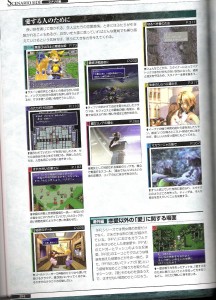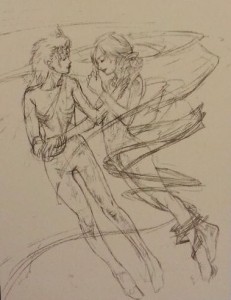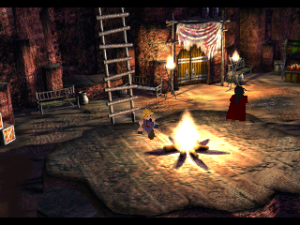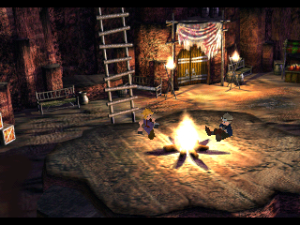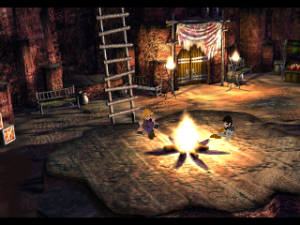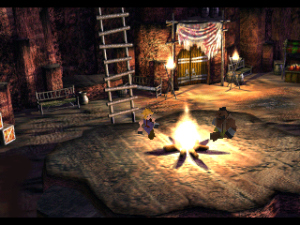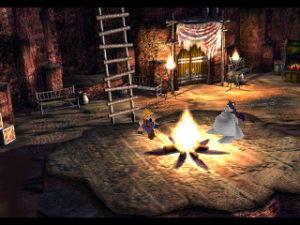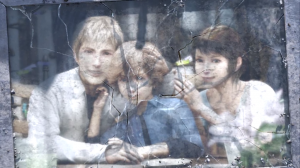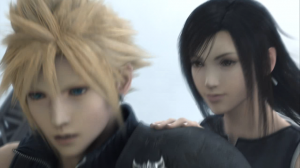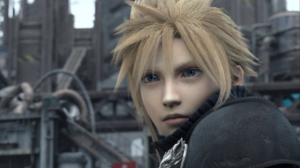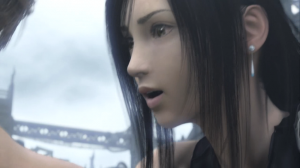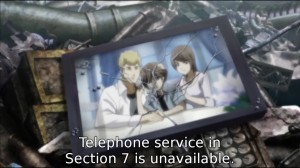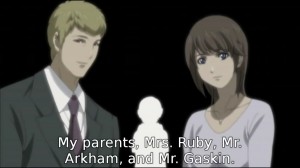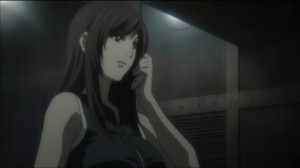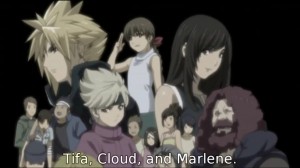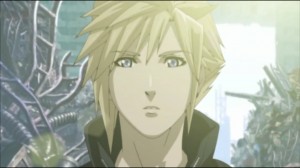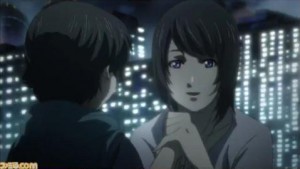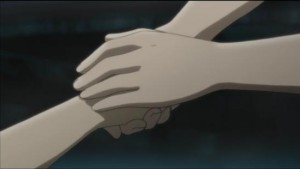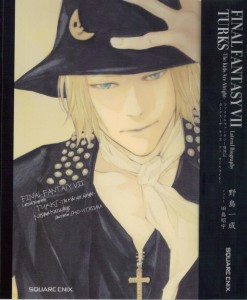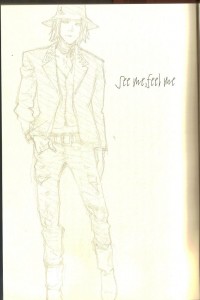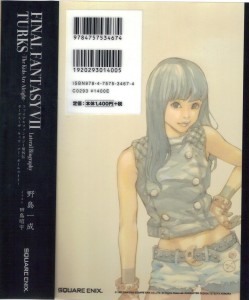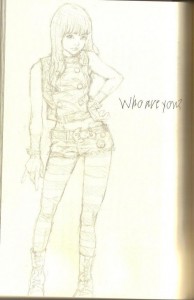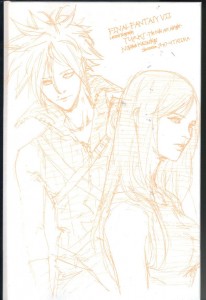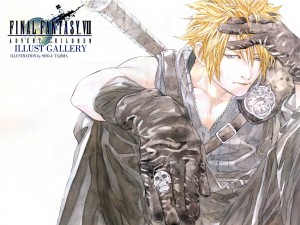A puppet who can see the strings …
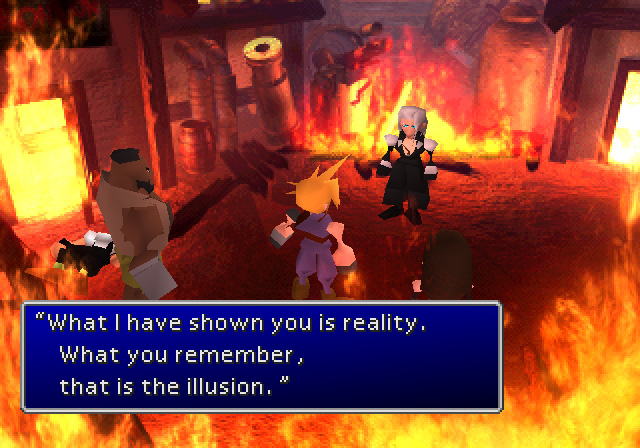
We are now much closer to determining the official answer to the question at the heart of the Love Triangle Debate.
As mentioned earlier, the LTD has raised many points of contention over its long history. What it has ultimately boiled down to, however, is which course of events one believes took place near the end of Disc 2 at the time the party goes their separate ways, each seeking a personal motivation to carry the fight to Sephiroth inside the Northern Crater.
Cloud and Tifa, of course, remain behind at the airship, alone together. The contents of the scenes which immediately follow this development are then based on the prior actions of the player, and how high they have raised Tifa’s affection for Cloud. For those not in the know, through many of the optional dialogues and actions one may take during Disc 1, the player is able to influence the degree of affection four members of AVALANCHE have for Cloud: Aerith, Tifa, Yuffie and Barret.
For a complete list of the choices that influence these affection ratings, as well as the affects these choices have on the affection values, see Terence Fergusson’s Date Mechanics Guide at GameFAQs.
Within the game, the outcome of the player’s choices are presented in three scenes, two on Disc 1 and the last on Disc 2.
The first event they influence is who will tour the Gold Saucer with Cloud if the player doesn’t make a selection for this choice when they first arrive at the amusement park. The character with the highest affection rating for Cloud will be the default option if the player proceeds to explore the park without first choosing a companion. Otherwise, if the player does elect to choose, the character whom they pick (Red XIII being an exception) will receive additional affection points for Cloud (+3), while speaking to either Yuffie, Aerith or Tifa and turning down their offer to join you results in their affection for Cloud decreasing (-2).
Turning down Red XIII, meanwhile, has no effect whatsoever.
Also, note that only the first selection made to increase or decrease affection values will actually do so. The effects of these choices are not cumulative if more than one such selection is made.
The second event influenced by the “date mechanics” is the game’s actual date at the Gold Saucer. The character with the highest affection rating for Cloud will come to his hotel room and drag him out for a night on the town.
Finally, the third event to feel the effects of the player’s choices is the fan-dubbed “Highwind scene” at the end of Disc 2, diverging into two scenes that fans have also named: the “High Affection scene” and the “Low Affection scene.” These names rather intuitively reflect the conditions by which both scenes are unlocked — i.e. if Tifa’s affection for Cloud is below a certain value, the Low Affection scene plays; if her affection is equal to or above a certain value, the High Affection scene is witnessed instead.
The differences in the two scenes are described thus on pg. 198 of the FFVII Ultimania Omega guidebook:
—
Night before the final battle……
After stopping Hojo’s recklessness and before heading to the Northern Crater, the conversation scene with Tifa can diverge drastically depending on Tifa’s affection rating. When the affection rating is low, the conversation of the scene where the two spend the evening is candid/apathetic and rather short. In the scene on the bridge the next morning, Tifa asks “Were you listening?” and taps her foot. On the other hand, if the affection rating is high, the two spend the evening in focused conversation, and on the bridge, Tifa asks “Were you watching?” and collapses in embarrassment.”[Caption for the screenshot of Cloud saying “This is probably the last time we’ll have together……”]
When the degree of affection is high, the night passes meaningfully between the two……
—Japanese text:
—
決戦前夜に……
宝条の暴走を止めてから大空洞へ突入するまでにくり広げられるティファとの会話場面は、ティファの好感度によって分岐する。好感度が低いと、ふたりで夜を明かす場面の会話 が淡白で短め。翌朝の操縦室の場面では、ティファが「聞いてたの?」と言ってつま先をトントンとする。一方、好感度が高いと、ふたりで夜を明かす場面 の会話が濃く、操縦室ではティファが「見てたの?」と恥ずかしがってへたりこむのだ。[Caption for the screenshot of Cloud saying “This is probably the last time we’ll have together……”]
好感度が高い場合、ふたりで過ごす夜が意味深なものに……。
—
You can observe the differences between the two versions in the following video and transcriptions (YouTube upload courtesy of TrippNessa):
(High Affection version transcription)
—
[Below the Highwind]Tifa: “Everyone’s gone…”
Cloud: “Yeah, we don’t have anywhere or anyone to go home to.”
Tifa: “You’re right…
But… I’m sure someday… they’ll come back, don’t you think?”Cloud: “Hmm… I wonder…?
Everyone has an irreplaceable something they’re holding on to…
But this time, our opponent…”Tifa: “Hmm… But that’s all right, even if no one comes back.
As long as I’m with you… As long as you’re by my side… I won’t give up even if I’m scared.”Cloud: “………Tifa……”
Tifa: “No matter how close we are… We were far apart… before this.
But when we were in the Lifestream surrounded by all those screams of anguish, I thought I heard your voice…
…sniff… you probably don’t remember this…
But deep in my heart I heard you calling my name… Or at least I thought I did…”Cloud: “Yeah… At that time I heard you calling me.
You were calling me back from the stream of consciousness in the Lifestream.
After all, I promised. That if anything were to ever happen to you, I would come to help.”Tifa: “Cloud…? Do you think the stars can hear us?
Do you think they see how hard we’re fighting for them?”Cloud: “I dunno… But…
Whether they are or not, we still have to do what we can.
And believe in ourselves…
I’ll find the answer someday. Right, Tifa?
That’s what I learned from you when I was in the Lifestream. ”Tifa: “Yeah…… that’s right…”
Cloud: “Hey Tifa…… I…… There are a lot of things I wanted to talk to you about.
But now that we’re together like this, I don’t know what I really wanted to say…
I guess nothing’s changed at all… Kind of makes you want to laugh…”Tifa: “Cloud… Words aren’t the only thing that tell people what you’re thinking…”
Cloud: “…………”
[Fade to black; the screen fades in early the next morning, with Tifa leaning against Cloud, asleep]
Cloud: “…………It’s almost dawn…”
Tifa: “H, huh…?”
Cloud: “Sorry. Did I wake you…? It’s almost dawn, Tifa.”
Tifa: “Umm… G, good morning… Cloud.
Give me a little longer… Just a little bit longer…
This day will never come again… So let me have this moment…”Cloud: “Yeah… okay.
This is probably the last time we’ll have together……”[The screen fades out once again, then fades back in to the sun fully risen and the two fully awake]
Tifa: “………”
Cloud: “We’d better go.”
Tifa: “But, I still…!?”
Cloud: “It’s all right, Tifa. You said so yourself yesterday.
At least we don’t have to go on alone.”Tifa: “Yes… That’s right!”
Cloud: “Okay! Let’s go!”
[Back on the airship]
Tifa: “The airship is too big for just the two of us.
Yeah, it’s a little lonely without everyone.”Cloud: “Don’t worry. It’ll be okay.
I’ll make a big enough ruckus for everyone.
Besides, I’m the pilot.
No more flying around casually like before.
We won’t have time to feel lonely.”Tifa: “Huh!?”
Cloud: “It’s moving……”
[On the bridge, they find Cid, Barret, Cait Sith and Red XIII, with Cid manning the controls]
Cloud: “Barret! Cid!”
Barret: “O, oh…… is that okay with you?”
Cloud: “Red XIII!”
Tifa: “Why didn’t you tell me!?”
Red XIII: “But, you know, Cid.”
Cid: “Hey, Red XIII.
If you butt in now, you never know what they’ll say later……”Tifa: “……Were you watching?”
[She quickly walks away before collapsing to the floor in embarrassment, her hands on her head, while Cloud, Cid and Barret all scratch their heads in embarrassment and Red XIII swishes his tail]
—(Low Affection version transcription)
—
[Below the Highwind]Tifa: “Everyone’s gone…”
Cloud: “Yeah, we don’t have anywhere or anyone to go home to.”
Tifa: “You’re right…
But… I’m sure someday… they’ll come back, don’t you think?”Cloud: “Hmm… I wonder…?
Everyone has an irreplaceable something they’re holding on to…
But this time, our opponent…”Tifa: “Hmm… But that’s all right, even if no one comes back.
As long as I’m with you… As long as you’re by my side… I won’t give up even if I’m scared.”Cloud: “………Tifa……”
Tifa: “No matter how close we are… We were far apart… before this.
But when we were in the Lifestream surrounded by all those screams of anguish, I thought I heard your voice…
…sniff… you probably don’t remember this…
But deep in my heart I heard you calling my name… Or at least I thought I did…”Cloud: “I see……
I think I’ve heard about it, too.
At that time, it was Tifa’s voice……”Tifa: “Cloud…? Do you think the stars can hear us?
Do you think they see how hard we’re fighting for them?”Cloud: “I dunno… But…
Whether they are or not, we still have to do what we can. And believe in ourselves…
I’ll find the answer someday. As long as I keep trying.”Tifa: “Yeah…… that’s right…”
Cloud: “We’ve got a big battle tomorrow, we’d better get some sleep…”
Tifa: “Umm. Yes, I guess you’re right……”
[Fade to black; the screen fades in early the next morning, with Tifa leaning against Cloud, asleep]
Cloud: “…………It’s almost dawn…”
Tifa: “H, huh…?”
Cloud: “Morning, Tifa. It’s almost dawn…”
Tifa: “Mmm…… Good morning, Cloud.
Give me a little longer… Just a little big longer…
This day will never come again… So let me have this moment…”Cloud: “…………”
[The screen fades out once again, then fades back in to the sun fully risen and the two fully awake]
Tifa: “………”
Cloud: “We’d better go.”
Tifa: “But, I still…!?”
Cloud: “It’s all right, Tifa. You said so yourself yesterday.
At least we don’t have to go on alone.”Tifa: “Yes… That’s right!”
Cloud: “Okay! Let’s go!”
[Back on the airship]
Tifa: “The airship is too big for just the two of us.
Yeah, it’s a little lonely without everyone.”Cloud: “Don’t worry. It’ll be okay.
I’ll make a big enough ruckus for everyone.
Besides, I’m the pilot.
No more flying around casually like before.
We won’t have time to feel lonely.”Tifa: “Huh!?”
Cloud: “It’s moving……”
[On the bridge, they find Cid, Barret, Cait Sith and Red XIII, with Cid manning the controls]
Cloud: “Barret! Cid!”
Barret: “O, oh…… is that okay with you?”
Cloud: “Red XIII!”
Tifa: “Why didn’t you tell me!?”
Red XIII: “But, you know, Cid.”
Cid: “Hey, Red XIII.
If you butt in now, you never know what they’ll say later……”Tifa: “……Were you listening?”
[She quickly walks away and begins tapping her foot against the deck while Cloud scratches the back of his head in embarrassment]
—
In the interest of being as transparent, thorough and comprehensive as possible, here follows translations from two official guidebooks that make reference to the affection values influencing the three scenes we’ve been discussing.
First, pg. 189 of the FFVII Kaitai Shinsho The Complete guide explains the game’s “love pyramid” and the results of its associated affection ratings system:
—
The Love Parameters and Related Events
FFVII’s greatest mystery(?) — the “affection ratings”
Dictated by the current status of the so-called “affection ratings” — in-game parameters regarding Cloud, developed for Aerith, Tifa, Yuffie and Barret (※information from the development staff) — the love present in the progression of certain events can be influenced.Lines selected during the choices that occasionally appear in conversation scenes……have a big impact. If a character’s response to a line chosen is positive, you can probably expect that their affection rating has increased. In addition, behavior involving the party exhibited during battles (such as healing or covering during a moment of crisis) can increase the rating as well, but the effect is very small in comparison to the dialogue choices.
How do the affection ratings influence events? Let’s look at some examples.
[Screenshot of the “slum drunk” question in Aerith’s church]
If a positive selection is made when a choice appears, the affection rating will increase.[Screenshot of Cloud covering Aerith during a random battle]
The roster of the party at certain times and behavior during battle also have a small influence.Mercurial Event 1 (The Companion)
During the first visit to the Gold Saucer, if one tries to make Cloud walk around alone, the female character with the highest affection rating at that point will go along.[Screenshot of the party standing in the lobby of the Gold Saucer]
Don’t speak to anyone here. Try to advance while ignoring all members.[Screenshot of Aerith stepping forward to tag along with Cloud]
If one tries to make Cloud go elsewhere, someone will go along after him like this (and be added to the party roster).Mercurial Event 2 (The Date)
The large event after obtaining the Keystone. That night, the character with the highest affection rating will come to Cloud with an invitation. Although the examples below feature Aerith and Tifa, Yuffie and Barret are also available.[Screenshot of Aerith retrieving Cloud from his hotel room]
Aerith’s event. If one plays normally, she usually shows up.[Screenshot of the fireworks during the date with Aerith]
On the gondola. The line “I’m searching for you” has deep meaning (you get it, right?).[Screenshot of Cloud and Tifa on the gondola ride]
Tifa’s event. Her cautious personality foils her, and she doesn’t share her feelings.[Screenshot of Cloud and Tifa coming off the gondola ride]
In the end, she doesn’t voice her intentions. She locks them away in her mind.Mercurial Event 3 (Before the Final Battle)
After each of the others departs for other places, Cloud and Tifa spend the evening together. At that moment, dependent on Tifa’s affection rating for Cloud, there can be differences in the 2 circumstances involving ‘the conversations they exchange between dusk and dawn,’ and ‘Tifa’s lines and reaction when she finds out that everyone might have seen (or heard) them.’[Screenshot of Tifa tapping her foot on the deck of the Highwind]
Example of a reaction. She turns her back and taps one foot on the deck.[Screenshot of Tifa collapsing in embarrassment on the deck of the Highwind]
Dependent on the affection rating, she may also crouch down in embarrassment.
—Japanese text:
—
恋愛パラメータと関連イベント
『FFVII』最大の謎(?)”好感度”
エアリス、ティファ、ユフィ、バレットの4人(※開発スタッフからの情報)には、クラウドに対する「好感度」という内部パラメータが用意されており、その状態によって、特定のイベントの進みかたが恋化するようになってい る。
好感度には、会話シーン中にときどき出る選択肢でどのセリフを選んだか……が大きく影響する。セリフを選んだあとのキャラクターの反応が良ければ、好感度は上がっていると思っていいだろう。このほか、パーティーに加えている時間や、戦闘中の行動 (ピンチのときに、回復してあげたり、かばってあげたりする)などでも上がるようだが、その影響は、選択肢にくらべれば微々たるものだ。
好感度が、どのようにイベントとかかわってくるのか。その代表例を紹介しよう。[Screenshot of the “slum drunk” question in Aerith’s church]
選択肢が出てくるところで、より良いほうを選べば好感度が上がる。[Screenshot from a random battle]
パーティーに加わっている時間や戦闘中の行動も、ほんの少し影響する。変化イベント1(同伴)
はじめてゴールドソーサーにきたとき、クラウドが単独行動をしようとすると、その時点で好感度のもっとも高い女性キャラクターがついてくる。[Screenshot of the party standing in the lobby of the Gold Saucer]
ここで、だれかに話しかけてはいけない。メンバーを無視して先へ進んでみよう。[Screenshot of Aerith stepping forward to tag along with Cloud]
どこかへ移動しようとすると、このようにクラウドのあとをついてくる(パーティーに加わる)。変化イベント2(デート)
キーストーン入手後の一大イベント。夜になると、好感度のもっとも高キャラクターがクラウドを誘いにくる。下ではエアリスとティファの例を紹介しているが、ユフィとバレッ トにも挑戦してみよう。[Screenshot of Aerith retrieving Cloud from his hotel room]
エアリスの場合。ふつうにプレイしていると、だいたい彼女がくる。[Screenshot of the fireworks during the date with Aerith]
観覧車にて。「あなたをさがしてる」のセリフが深い(わかるよね?)。[Screenshot of Cloud and Tifa on the gondola ride]
ティファの場合。思慮深い性格がわざわいしてか、本音を切り出せに。[Screenshot of Cloud and Tifa coming off the gondola ride]
結局、最後まで本音を言えず。心の中にしまいこんでしまうのだった。変化イベント3(決戦前)
ほかのみんながそれぞれの場所へ散っていったあと、クラウドとティファが、ふたりきりで夜を明かす。このとき、「夕暮れから夜明けにかけて、ふたりがかわす会話」と、「み んなにその様子を見られて(聞かれて)いたことを知ったときのティファのセリフとリアクション」の2つが、ティファのクラウドに対する好感度によって変化する のだ。[Screenshot of Tifa tapping her foot on the deck of the Highwind]
リアクションの一例。うしろを向いて、片足のツマ先で床をたたく。[Screenshot of Tifa collapsing in embarassment on the deck of the Highwind]
好感度によっては、あまりの気恥ずかしさに、うずくまってしまうことも。
—[Author’s note: It bears pointing out that the Kaitai Shinsho information here isn’t entirely accurate. As noted in Terence Fergusson’s Date Mechanics Guide, the “slum drunk” question actually doesn’t affect anyone’s affection value, and it’s also possible that Red XIII will stand in for Barret during the first visit to the Gold Saucer if Barret’s affection value is higher than that of the females. Furthermore, due to an apparent programming oversight, actions taken in battle have no impact whatsoever on the date mechanics.]
Secondly, pg. 467 of the FFVII Ultimania Omega says the following:
—
“ULTIMANIA COLUMN The other events influenced by the affection ratings
The following two scenes change according to developments in the affection ratings, in the same manner as the date event.
●When visiting the Gold Saucer for the first time…….If one attempts to move to another map alone, the character with the highest affection rating will come forward to go along (→126).
●The conversation with Tifa the night before the final battle……If the degree of Tifa’s affection is above a certain value, there is a variation in the exchange between the two (→201)。[Screenshot of Red XIII accompanying Cloud after the first arrival at the Gold Saucer]
In the event that Barret’s affection rating is the highest during the visit to the Gold Saucer, Red XIII will step forward to be his substitute.[Screenshot of Tifa collapsing in embarrassment on the deck of the Highwind]
Also take notice of Tifa’s reaction to being teased by Cid and co. In the event of Tifa’s affection rating being high, she’ll say ‘……Were you watching?’ and put her hands on her head.”
—Japanese text:
—
ULTIMANIA COLUMN 好感度が影するそのほかのイベント
以下のふたつの場面では、デートイベントと同様に、好感度によって展開が変化する。
●はじめてゴールドソーサーを訪れたとき……ひとりで別のマップに移動しようとすると、好感度のもっとも高いキャラクターが、一緒に行こうと申し出る(→126)。
●最終決戦値前にティファとふたりきりで語り合うとき……ティファの好感度が一定値以上ああると、ふたりのやりとりが変化する(→201)。[Screenshot of Red XIII accompanying Cloud after the first arrival at the Gold Saucer]
ゴールドソーサーを訪れたときに、バレットの好感度がもっとも高い場合は、例外的にレッドXIIIが同行を申し出る。[Screenshot of Tifa collapsing in embarassment on the deck of the Highwind]
シドたちに冷やかされたティファの反応にも注目。好感度が高い場合は、「……見てたの?」と言って頭かかえる。
—
Additional information found in Ultimania guidebooks reveals that after the fade to black in the High Affection version of the Highwind scene, Cloud and Tifa shared a physically intimate moment as their way of showing their feelings for one another. This is confirmed in several official statements, one of which is found on pg. 27 of the FFVII Ultimania Omega, in Tifa’s profile:
—
When Cloud proposes that the group separates temporarily, she remains behind at the airship and communicates her feelings together with Cloud. The next morning, she departs for the Northern Crater along with her companions, who returned.“Words aren’t the only thing that tell people what you’re thinking……”
—Said to Cloud, when he is at a loss for words while they’re aloneIf Tifa’s affection regarding Cloud is high, when the two stay behind at the airship, they will confirm their feelings of desire/wanting for one another together. This line is said by Tifa at the conversation’s end. Immediately after saying it, Tifa forms a striking smile that summarizes everything.
—Japanese text:
—
クラウドの提案で一時解散することになるが、飛空艇に残り、クラウドと想いを通わせる。翌朝、もどってきた仲間とともに北の大空洞へ発つ「想いをつたえられるのは言葉だけじゃないよ……」
ーふたりきりになり、言葉に詰まるクラウドティファのクラウドに対する好感度が高い場合、飛空艇に残ったふたりは、互いを求める気持ちを確かめ合う。このセリフは、そんな会話の最後にティファが口にするもの。告げ た直後にティファが浮かべる、すべてを受けいれるような微笑みが印象的だ。
—
For those interested, by the way, the significant line quoted above as written in Japanese romaji — is as follows: “Tifa no Cloud ni taisuru koukan do ga takai baai, hikuutei ni nokotta futari ha, tagai wo motomeru kimochi wo tashikame au.” It breaks down thus:
—
Tifa = Tifa, obviously
no = particle indentifying possessive “of” or “for”
Cloud = Cloud, obviously
ni taisuru = “with regard to” or “concerning”
koukan = “affection”
do = “rating”
ga = identifies that the previous noun or clause is a subject
takai = high
baai = “occasion” or “circumstance,” so, for this sentence, “in the event that”
hikuutei = “airship”
ni = particle identifying a place where something occurs “in” or “at”
nokotta = “remained”
futari = two people, so, for this sentence, “the two”
ha = main subject identifier; here, it’s identifying everything said up to now
tagai = “each other”
wo = particle indicating that the previous noun or clause is the target of an action to follow
motomeru = “to want” or “to seek”; refers to something actively wanted/desired
kimochi = “feelings”; modified by “motomeru,” the sentence is talking about “feelings of desire” or “feelings of wanting,” which are being directed toward whatever noun preceded the “wo” that preceded “motomeru”; in this case, “tagai”/”each other”
wo = another target of action identifier; tells us that “feelings of wanting each other” is the recepient of some as-yet unidentified action
tashikame = “confirmation”; tells us that the “feelings of wanting each other” are confirmed
au = “to fit,” “to harmonize” or “to match”; as this verb modifies everything that came before, it’s probably best translated here as “together”
—
As you can see, here it is said that they confirm feelings of desire for one another. While that alone may not sufficiently allude to something of an intimate nature occurring in that scene, an exchange during an interview in the FFVII 10th Anniversary Ultimania (pg. 9 of both the original and Revised Edition) does. Here, Kazushige Nojima describes the scene as containing a risque line of dialogue, referring to Tifa’s “words aren’t the only way” line.
He also goes on to describe the original presentation of the scene, which was even more suggestive:
(translation by hitoshura)
—
Kitase: “Katou also did the event on the airship, the night before the final battle.”Nojima: “Oh, the scene with the risqué line of dialogue? It was
Katou who wrote that as well, not me.”―”The line ‘Words aren’t the only way to tell someone how you feel,’ right? That was quite a mature conversation for a FF game.”
Kitase: “But I remember having to get another version that was too intense toned down.”
Nojima: “The original idea was more extreme. The plan was to have Cloud walk out of the Chocobo stable on board the Highwind, followed by Tifa leaving while checking around, but Kitase turned it down. But even with the line in question, maybe at that time none of us thought it would be something so important (laughs).”
—Japanese text:
—
北瀬 決戦前夜の飛空艇でのエベントも加藤さんですよね。野島 ああ、きわどいセリフがあところですか?あれを書いたのも、僕ではなくて加藤さんです。
―「想いをつたえられるのは、言葉だけじゃないよ」というセリフですね。『FF』としては、かなり大人っぼい会話でした。
北瀬 それでも、あまりにもどぎつい表現は抑えてもらった覚えがありますね。
野島 当初のアイデアは、もっと過激でしたから。飛空艇のなかにあるチョコボ部屋からクラウドが先に出てきて、そのあとティファが周囲をうかがいながら出てくるっていう案 だったんですけど、それはさすがに北瀬さんが却下してました。でも、問題のセリフにしても、当時はそんなに重要なことだと誰も思ってなかったのかもしれない( 笑)。
—
Also notable here to the topic at hand is the reference to Masato Katou, whom Kazushige Nojima referred to as the one who wrote the dialogue in this part of the game.
Katou would soon after pen another Square-developed RPG, “Xenogears” — a game which contains a scene near its ending very similar to the High Affection scene with Cloud and Tifa. In this love scene from “Xenogears,” some of the dialogue even recalls the High Affection Highwind scene (YouTube upload courtesy of Chilavert2010):
Note the similarities to the High Affection Highwind scene in the fade to black immediately prior to intimacy, and the male character saying to the female character “Sorry. Did I wake you?” the next morning.
The question now becomes, “Which scene is canon?” Based on the descriptions of the two on pg. 198 of the FFVII Ultimania Omega, we know that in one version (the Low Affection version) the conversation is candid/apathetic — i.e. lacking in feelings — and was contrasted against a scene with meaningful contents.
Let us also note at this time that it is Tifa’s affection level for Cloud that is said to influence the outcome of events. That alone is a significant observation in analyzing this scene.
Furthermore, let us not forget that — despite the game mechanic provided to us with the affection values — Tifa always loves Cloud romantically within the actual story.
Given what we know thus far, it is actually a very simple matter to determine which scene is canon, as numerous official sources tell us that Cloud and Tifa shared feelings on that evening. We’ll now go over those sources, in order of their chronological release.
The first source is pg. 14 of the FFVII Kaitai Shinsho The Complete guide, in the Analects of Tifa section of her profile:
—
“Words aren’t the only thing that tell people what you’re thinking” (when she and Cloud are alone the night before the final battle)
—Japanese text:
—
「想いを伝えられるのは言葉だけじゃないよ」(最終決戦前夜、クラウドとふたりきりのときに)
—
Next is pg. 15 of the FFVII Ultimania Omega, in Cloud’s profile. There, the following is said:
—
Declares that the team should dissolve in the final hours before the final battle, and communicates his feelings together with Tifa, who remains behind at the airship with him.
—Japanese text:
—
最終決戦を前に一時解散を宣言し、飛空艇に残ったティファと想いを通わせる。
—
As mentioned above, in Tifa’s profile on pg. 27 of the FFVII Ultimania Omega, we’re also told that feelings were exchanged that evening:
“When Cloud proposes that the group separates temporarily, she remains behind at the airship and communicates her feelings together with Cloud.
Japanese text:
—
クラウドの提案で一時解散することになるが、飛空艇に残り、クラウドと想いを通わせる。
—
Next, pg. 198 of the FFVII Ultimania Omega:
—
When their companions disperse to the places where people important to them await, Cloud and Tifa are the only two to remain behind. They reveal their feelings for each other in their final hours, and…….
—Japanese text:
—
大切な人の待つ場所へと仲間が散っていき、ふたりきりになたクラドとティファ。残された最後の時間でお互いの想いを打ち明け、そして……。
—
And then pg. 33 of the Crisis Core Ultimania, in Tifa’s profile from that book:
—
She communicates her feelings together with Cloud in the final stages of the story, and in AC and DC they live together.
—Japanese text:
—
クラウドとは物語の終盤に想いを通わせ、「AC」「DC」の時代は一緒に暮らしている。
—
Pg. 118 of the FFVII 10th Anniversary Ultimania (pg. 120 of the book’s Revised Edition; scan courtesy of Quexinos), in its Story Playback segment for FFVII:
—
Cloud and Tifa, who remain, reveal their feelings for each
other and clarify them together.
—Japanese text:
—
残ったクラウドとティファは、互いへの想いを打ち明け、確かめ合う。
—
This statement, by the way, is made next to a numbered notation that is matched to a numbered screenshot from the High Affection version of the Highwind scene: Cloud and Tifa are shown sleeping together in the early morning with Cloud saying “This is probably the last time we’ll have together……” — a line he only says in the High Affection version of the scene.
Pg. 195 of the FF 20th Anniversary Ultimania File 1: Character guide; the Impressive Words section of Tifa’s profile:
—
“Words aren’t the only thing that tell people what you’re thinking…”
—Prarie: What she said to Cloud the night before the final battle when he said there were many things he wanted to talk about
—Japanese text:
—
「想いを伝えられるのは言葉だけじゃないよ……」
——荒野:最終決戦を前に、話したいことは多いが言葉に詁まるクラウドに
—
Next, let’s look at pg. 232 of the Final Fantasy 20th Anniversary Ultimania File 2: Scenario guide. There, in this book’s Story Playback section for FFVII, we find this line:
—
And when Cloud and Tifa remain behind alone, in their final hours, they reveal their feelings for each other together.
—Japanese text:
—
そして、ふたり、きりになったクラウドとティファは、残された最後の時間で互いの想いを打ち明け合う。
—
And for those following the Japanese romaji constructions: “Soshite, futari, kiri ni natta Cloud to Tifa ha, nokosareta saigo no jikan de tagai no omoi wo uchi ake au.”
You’ll notice, by the way, that the Japanese form of this line is constructed almost identically to the line in the FFVII 10th Anniversary Ultimania, which was unquestionably referring to the High Affection scene. The only notable difference is that the 10th Anniversary Ultimania’s statement includes 確かめ (“tashikame,” meaning “confirmation”) before the verb 合う (“au”). As such, it’s certainly reasonable to conclude that those who wrote the two books would expect us to believe both are describing the same development.
Further still, in the sidebar to the right of the primary passage in which the above quote appears, following one of the story summary’s several “Deviation” (分岐) arrows, we find the following:
(translation by hitoshura)
—
Deviation
There are 2 versions of the conversation before the final battle. The conversation between Cloud and Tifa before the final battle will differ depending on Tifa’s degree of affection. If her affection value is high, the content of their conversation will be deep, showing that they strongly care for each other. Also, in the scene where Tifa is embarrassed to discover the next morning that the team were watching her and Cloud, her reaction when her affection is high is greater.
—Japanese text:
—
分岐
決戦前の会話は2種粨ある
決戦前にクラウドとティファが交わす会話の内容は、ティファの好感度によって変わる。好感度が高いと、ふたりの会話が、お互いを強く思いやるような深い内容になるのだ。ま た、ふたりの樣子を仲間たちが見ていたことが翌朝発覚し、ティファが照れる場面では、好感度の高いときのほうが、彼女の照れかたが大きい 。
—
While acknowledging the existence of another version of the scene, the main body of the story summary itself used the High Affection version in its description of events, and even this blurb doesn’t bother with describing the Low Affection version — which, again, was described elsewhere as containing a conversation that lacked feelings.
The description of the High Affection version here implicitly contrasts it against a scene with a conversation lacking in deep subject matter, while the description of the Low Affection version from pg. 198 of the FFVII Ultimania Omega implicitly contrasts it against a version that features a conversation containing feelings — the message being clear that the conversation from the High Affection version is mutually exclusive from a version lacking deep subject matter, while the conversation from the Low Affection version is mutually exclusive from a version in which feelings are discussed.
Those descriptions align perfectly with what we witness in the two versions, as seen in the game. Cloud definitely doesn’t communicate his feelings to Tifa in the Low Affection scenario; certainly none that are about her — and especially none that appear to match her own feelings of desire. He just listens to her talk and then says they should get some sleep.
On the other hand, in the High Affection version, he has quite a bit to say and is left trying to find the words to communicate “a lot of things I wanted to talk to you about” when Tifa suggests they employ a physical demonstration.
Given, then, that we are told numerous times — including in passages that don’t mention the different versions of the scene; and, in the case of the FFVII 10th Anniversary Ultimania, a book that doesn’t mention the different versions of the scene anywhere between its covers — that feelings were exchanged between Cloud and Tifa that evening, the High Affection version must have taken place.
It also bears acknowledgement at this point that the phrases “communicate their feelings ” (想いを通わせる) and “reveal their feelings for each other” (互いの想いを打ち明け) carry the same connotation that “realized their feelings for each other” does in English, particularly when the Japanese word for “feelings” (“omoi”) is rendered as it is here: “想い.” This kanji for “omoi” is typically used to denote intimate feelings, while feelings in general tend to be represented with the other kanji for “omoi”: 思い.
You need not take my word alone on that, by the way.
Not only are you free to look into the matter yourself, but if you fear a bias on my part coloring my reading of those phrases, I also ask that you look to insight provided by Michael DePaula at AllExperts.com, whose expertise stems from some 10 years of experience with the Japanese language, most of which were spent in Japan. TheLifestream.net forum member Quexinos brought the matter to him for input, providing the quote from pg. 33 of the Crisis Core Ultimania, and was presented the following explanation:
“It’s better to use 伝える for normal exchanges. 想いを通わせる implies something intimate.”
Quexinos also took the question to masaegu, a Japanese native at JapanForum.com, supplying the same quote from the CC Ultimania. She was told: “The sentence in question is clearly about a romantic relationship,” and masaegu even went so far as to say “Show me a native Japanese-speaker that thinks the sentence … is NOT about a romantic relationship, I will show you a liar.”
Concerning “omoi,” masaegu also added:
“Basically, it is only a matter of aesthetic preference between 思 and 想. Since many prefer using the latter, it has kind of become the normal choice in talking about love or something very important.”
Among the most definitive statements of all comes on pg. 394 of the FF 20th Anniversary Ultimania File 2: Scenario guide, in a section entitled “For the One I Love.” There, scenes of romantic declaration from throughout the Final Fantasy series (i.e. entries in the main game series that had been published by the time of the book’s own publication) are presented.
Here is my translation of that page:
—
For the One I Love
Through the long journeys, the love of the protagonists develop. Occasionally they become separated, but the two’s value to one another gives them the great strength to overcome whatever crisis may come.[Screenshot of Sara and Ingus from the ending of the DS version of FFIII]
III – The diligent soldier and the meek princess
The love between the soldier and princess of Sasune Castle was divided by social status; Ingus tried to supress his feelings, but Sara would not hide hers.[Screenshot from when Cecil rescues Rosa from Golbez]
IV – World just for the two of us
When rescuing Rosa, Cecil frankly declares his true feelings. The two reunited, they tightly embrace for all eyes to see.[Screenshot from when the Espers are making peace with General Leo]
VI – Result of the chance encounter
The imperial general and the anti-empire organization member — Celes and Locke’s relation to one another is like ships passing in the night; it’s a long period before they get to communicate their feelings completely.[Screenshot of Aerith’s date with Cloud at the Gold Saucer]
VII – Secret date
At the Gold Saucer, Cloud receives an invitation from one of his companions. Who comes around with the invitation is dependent on Cloud’s behavior.[Screenshot of Cloud and Tifa underneath the Highwind]
VII – The night before the final battle
Thanks to Tifa, Cloud regains himself, and before the final battle with Sephiroth, he confirms with her feelings that can’t be expressed in words.[Screenshot of Squall and Rinoa hugging inside the Sorceress Memorial]
VIII – Witch Rinoa’s knight
Just before she can be sealed due to being a witch, Squall retakes Rinoa. “I don’t care that you’re a witch” are his words to her, putting her mind at ease.[Screenshot of Steiner and Beatrix preparing to defend Alexandria from
Kuja’s invasion]
IX – For the one I must protect
Beatrix becomes the woman to whom Steiner will let no harm befall. For his homeland’s protection and for hers, Steiner brandishes his sword.[Screenshot of Zidane and Dagger reunited during the game’s ending]
IX – Guidance on an investigation of life
Zidane left the company of his companions in front of the Iifa Tree. He survived for the sake of going back to “the place I’ll return to someday,” where the one he loves was waiting for him.[Screenshot of Yuna and Tidus together in the Macalania spring]
X – Macalania spring
Yuna is betrayed by the temples she had completely believed in and had made the foundation of her life. Tidus decides to comfort her in this way.Extra Thread
Scenes involving “love” other than romantic love
In the FF series, there’s not just the romantic love between men and women; there are various forms of love depicted. In FFV, there’s familial love between Galuf and Krile, as well as the brotherly love between Edgar and Sabin depicted in FFVI; and in FFIX, there’s an instance of love between Eiko and Mog that goes beyond race. Also, in FFVI, there’s the scene where Terra recovers her ability to fight and comes to understand the emotion called “love”; when talking about “love,” this is a scene that shouldn’t be left out.[Screenshot caption beneath the screenshot of Terra after transforming into
her Esper form in the World of Ruin]
During the event where Terra recovers her ability to fight, she regains her power and says “I’ll fight to protect the people I love”; she then throws herself back into battle.
—Japanese text:
—
『愛する人のために』
長い旅を通じて築かれる、主人公たちの恋愛感情。ときにはふたりが引き裂かれることもあるが、お互いを大事に想っていればどんな難局でも乗り越えていけるという気持ちは、 彼らに大きな力を与えてくれる。[Screenshot of Sara and Ingus from the ending of the DS version of FFIII]
「III」真面目な兵士と素直な姫
サスーン城の兵士と姫という身分ちがいの恋に、イングスは自分の気持ちを押し殺そうとするが、サラは彼への想いを隠そうとしない。[Screenshot from when Cecil rescues Rosa from Golbez]
「IV」ふたりだけの世界
捕らわれていたローザを救い出したとき、セシルは自分の本心を打ち明ける。再会したふたりは、人目も気にせず強く抱き合った。[Screenshot from when the Espers are making peace with General Leo]
「VI」すれちがいの果てに
帝国の将軍と反帝国組織の一員 — お互いの立場ゆえにすれちがっていたセリスとロックは、長い期間を経てようやく想いを通わせた。[Screenshot of Aerith’s date with Cloud at the Gold Saucer]
「VII」秘密のデート
ゴ―ルドソーサーで仲間のひとりから誘いを受けりクラウド。誰が誘いにやってくるかは、それまでのクラウドの行動しだい。[Screenshot of Cloud and Tifa underneath the Highwind]
「VII」最終決戦前夜に
ティファのおかげで自分を取り戻したクラウドはセフィロスとの最後の戦いを前に言葉では伝えられない想いを彼女と確かめ合う。[Screenshot of Squall and Rinoa hugging inside the Sorceress Memorial]
「VIII」魔女リノアの騎士
魔女として封印される直前のリノアを、無心で奪還するスコ―ル。「魔女でもいいさ」
という彼の言葉は、リノアの心に安らぎを与えた。[Screenshot of Steiner and Beatrix preparing to defend Alexandria from
Kuja’s invasion]
「IX」守るべき者のため
ひょんなことから、スタイナーにとってベアトリクスはかけがえのない女性となった。祖国と彼女を守るため、スタイナーは剣を振るう。[Screenshot of Zidane and Dagger reunited during the game’s ending]
「IX」生命のしらべに導かれ
イーファの樹で仲間の前から姿を消したジタン。彼は「いつか帰るところ」へ帰るために生きのび、愛いい人の待つ場所にもどってきた。[Screenshot of Yuna and Tidus together in the Macalania spring]
「X」マカラニ―アの泉で
ずっと信じていた寺院に裏切られユウナは心のよりどころを矢った。ティ―ダは、そんな彼女を支えていくことを決意する。番外編
恋愛以外の「愛」に関する場面
「FF」シリーズでは男女間の恋愛だけでなく、さまざまな形の「愛」が描かれている。「FFV」におけるガラフとクルルをはじめとした家族愛や、「FFVI」のエドガーとマッシュのような兄弟愛、「FFIX」のエーコとモグのような種族を越えた情愛なだがその一例だ。また、「FFVI」においてティナが「愛」という感情を知ることで戦う力を取りもどすシ―ンは、「愛」そのものを語るうえで、はずせない場面のひとつだろう。[Screenshot caption beneath the screenshot of Terra after transforming into
her Esper form in the World of Ruin]
一度は戦う力を矢ったティナは、「愛する者のために戦う」ということを知って力を取りもどし、ふたりび戦いに身を投じる。
—
Also, for those who may be interested in the romaji construction of the pivotal line here (“Thanks to Tifa, Cloud regains himself, and before the final battle with Sephiroth, he confirms with her feelings that can’t be expressed in words”), it is as follows: “Tifa no okagede jibun wo tori modoshita Cloud ha Sephiroth tono saigo no tatakai wo maeni kotoba deha tsutaerarenai omoi wo kanojo to tashikame au.”
Not only is the statement plainly made here that the event in question happened, and without qualifying the matter on the basis of the date mechanics, but you’ll also notice that the Japanese text in the caption about Locke and Celes uses the same “communicated their feelings” (想いを通わせた) phrasing that was used several times in regard to Cloud and Tifa.
Further, we’re asked to connect this romantic description of the scene to the Story Playback’s summary of FFVII earlier in the book. Tifa’s line in the accompanying screenshot on the “For the One I Love” page (“This day will never come again… So let me have this moment…”) is quoted in floating text on pg. 232 below the summary of the scene and next to a screenshot of Cloud and Tifa under the Highwind.
Sure, the quote itself appears in both versions of the scene, but the obvious connection being drawn between the story summary and the “For the One I Love” page is asking to be pointed out.
While on the subject of the “communicated their feelings” phrase, please note also this passage from Rinoa’s profile on pg. 135 of the FF 25th Memorial Ultimania Vol. 2:
—
A friendly and cheerful young woman, part of the resistance group called the Forest Owls, whose goal is the liberation of Timber. She joins in Squall and co.’s activities when they are dispatched by SeeD, and also participates in the witch assassination plot, which she wasn’t supposed to be involved with. During the conflict, she inherits the powers of a witch from Edea; she begin to fear that she will become an enemy of the whole world, but Squall communicated his feelings to her and protects her as she faces Ultimecia.
—Japanese text:
—
ティンバー独立を目指すレジスタンス「森のフクロウ」に身を置く、人なつっこくて快活な少女。 SeeDとして派遣されたスコールたちと行動をともにし、自身の当初の目的ではない魔女討伐作戦にも協力。戦いのさなかイデアから魔女の力を継承してしまい、自分が世界中の人々の敵となることに恐れを抱くが、想いを通わせたスコールに守られつつアルティミシアに立ち向かう。
—
Along that same vein, consider as well this line about FFIX’s Beatrix and Steiner from pg. 241 of the same book:
(translation by hitoshura)
—
A Love That Started With A Misunderstanding
To Beatrix, Steiner is the one opponent who has defeated her, and they both harbour a rivalry towards each other. But after mistaking Eiko’s love letter for one sent to them from each other, they start to take notice of one another and in the ending make their feelings known.
—Japanese text:
—
恋のはじまりはカンちがいから
ベアトリクスにとってスタイナーはただ一度敗北を喫した相手であり、双方ともに対抗意識を燃やしていた。だが、エーコのラブレターを互いが互いに宛てたものだ とカンちがいして以来、ふたりは意識し合うようになり、エンディングで想いを通わせる。
—
The same phrase appears once again with regard to Tidus and Yuna’s moment of revelation to one another on pg. 60 of the FFX Ultimania Omega, in its Story Playback for that game:
—
At the mysterious spring that glitters like the stars, the two kiss and embrace many times, confirming their feelings for one another.
—Japanese text:
—
星をのようにきらめく神秘の泉のなで、ふたりは、互いの想いを確かめ合うかのように幾度も抱擁し、唇を重ねた。
—
Likewise, the phrase appears for Cecil and Rosa’s moment of revelation on pg. 110 of the FF 20th Anniversary Ultimania File 2: Scenario guide in FFIV’s Story Playback section:
—
Reunited safely, Rosa and Cecil embrace one another, confirming their feelings for each other.
—Japanese text:
—
無事に再会を果たしたローザとセシルは、思わず抱き合ってお互いの想いを確かめる。
—
The similar phrase, “reveals feelings”/想いを打ち明けられる (recall that it has been used for Cloud and Tifa as well) is used for FFVIII’s Zell and Library Girl with a Pigtail on pg. 141 of the FF 25th Memorial Ultimania Vol. 2:
(translation by hitoshura)
—
Romance with the Library Girl with a Pigtail
Despite being seen as a troublemaker by the faculty, he is fairly popular with the students and people of Balamb. In particular, the member of the library committee with a pigtail likes him, and eventually she reveals her feelings to him.
—Japanese text:
—
三つ編みの図書委員とのロマンス
教師陣からは問題児あつかいされているものの、生徒やバラムの人々からの人気はそこそこ。なかでも三つ編みの図書委員には好意を持たれており、やがて彼女から 想いを打ち明けられる。
—
Now, ask yourself: What’s more likely? That all of these similar — and often identical(!) — choices of phrasing refer to the same thing, or that Cloud and Tifa are an arbitrary exception to the commonplace understanding of phrases being used in their commonplace context to describe no less than five other Final Fantasy couples — four of whom were also featured on the “For the One I Love” page?
Keep in mind, too, that we’re discussing quotes from guide books — the purpose of which is presumably to *guide* the reader to an understanding of what took place on the screen. This isn’t a religious text written in metaphorical prose with ambiguous phrasing. It’s not even a literary composition that can stand alone and be valued on its own; it is a companion to such a composition. A guide book’s purpose is to tell you what you need to know to understand the primary work.
If the writer(s) of these guide books (repeatedly!) use this idiom that has a romantic connotation, and they’re using it to (repeatedly!) describe the same situation — one with a verified romantic context, at that — it stands to reason that the romantic connotation is an intended element of the understanding we’re being guided to.
There may be nothing inherently romantic in the idiom “communicated their feelings to each other,” but there isn’t anything inherently romantic in the English idiom “realized their feelings for each other ” either — yet because of the common usage they see in literary contexts, they are romantic phrases. They would not be used in a situation that could be taken for romantic unless the understanding of a romantic element was intended.
Look at all these phrases that have meanings different from what the words “inherently” mean (we’ll ignore for the moment how preposterous it is to ever assume inherent meaning for *any* symbol):
“This car is moving at a snail’s pace” “You have some bats in your belfry” “He kicked the bucket” “He bought the farm” “You can lead a horse to water, but you can’t make it drink” “It’s my way or the highway” “One bad apple spoils the whole bunch” “Shout it from the rooftops” “They know where their bread is buttered” “Birds of a feather flock together” “Dude is going postal” “When dad found my stash, he hit the roof” “She’s a bad egg” “He’s the big cheese” “Things are about to hit the fan” “If you can’t stand the heat, get out of the kitchen” “A decent movie, but nothing to write home about” “I overheard them while dropping some eaves” “The automobile industry was Detroit’s bread and butter” “You can tell who rules the roost in this house” (or “wears the pants”) “His plan was like a house of cards” “Time to ride off into the sunset” “Now you’re cooking with gas” “You can’t get blood from a stone” “That’s the ticket” “Don’t cry over spilled milk” “We’re just chewing the fat “ “Half-assed efforts aren’t going to cut the mustard” “Life ain’t a bed of roses” “We can’t rest on our laurels” “Don’t put all your eggs in one basket” “I’m cool as a cucumber” “You’re comparing apples and oranges” “A little bird told me” “You reap what you sow” “He’s loaded for bear” “It’s ten miles as the crow flies” “We’re beating a dead horse” “This music is driving me up the wall” “He said some really off-the-wall stuff” “His elevator doesn’t go all the way to the top” “A stitch in time saves nine” “What got your panties in a twist?” “People in glass houses shouldn’t throw stones” “The lights are on, but nobody’s home” “They’ve got him between a rock and a hard place” “My back is to the wall” “What you said really hit home” “The family has some skeletons in their closet” “Charity begins at home” “That’s water under the bridge” “What are you doing in this neck of the woods?”
And there’s about 25,000 more of them in the English language alone — few of which would make sense to anyone who’s applying the literal meanings of the words involved. None of these idioms exist (at least not with the same wording) in Japanese.
That language had a separate origin, developed differently, was used by a different culture, and its own idioms came along. As with the English idioms, many of these would make no sense to someone applying the literal meanings of the words. For example, 猫に小判 (“neko ni koban”). The literal meaning of the words is “gold coins to a cat.” The meaning of the phrase involves something being given to someone who can’t appreciate it.
In other words, it’s equivalent to the English idiom, “casting pearls before swine.” Same meaning, different phrases. Like “communicated their feelings to each other” (Japanese) and “realized their feelings for each other” (English).
Think of it like the English idiom “It’s a small world,” and its Spanish counterpart “El mundo es un pañuelo” (literally: “The world is a handkerchief”).
As TheLifestream.net forum member hitoshura once put it, Japanese is “a different language; it’s not just some version of English with squiggly shapes.”
The point being: A writer worth their salt is going to know the idioms of their own language, especially if writing a book intended for informative purposes. Put simply, they would not use the “communicate their feelings” phrase to refer to the moment two brothers were reunited after being separated for 10 years, just as a writer whose native language is English would not describe that same situation by saying “The reunited brothers realized their feelings for each other.”
Unless, of course, they were specifically telling a romantic story about two brothers.
If I were to write a review of the film “Antwone Fisher” and said “In the film’s final moments, Antwone is at last reunited with his long-lost family in a moving love scene,” you’d be understandably taken aback. Is it a scene in which love is expressed? Yes. Is it a love scene? No. “Love scene” refers to something very specific in film, despite the words alone not lending to that understanding.
The same is true of two people “realizing their feelings for each other”— or “communicating their feelings to each other.”
Added to all that, keep in mind the target audience for Final Fantasy VII — and Final Fantasy in general — is a teenage-to-20-something audience. We know this because Yoshinori Kitase, the current executive producer of the Final Fantasy series and director of FFVII, said as much in a May 2009 interview with Edge magazine:
—
We ask Kitase if, as he settles into his 40s, he ever thinks about those members of the Final Fantasy audience who have also grown up with the series. After all, even those players who only joined the fanbase with the seventh game in the series, the first to make a truly global impact, are now entering their 30s. Surely the expectations of these players and the things that they look out for in games are different now to what they were ten, 15 years ago. Is Square Enix interested in changing the tone or theme or style its output to meet these changing needs of the audience?“I actually think that it’s a very natural thing for players to grow out of the Final Fantasy series,” he answers. “In terms of the age group we target with each new game, it remains the teens to 20-somethings. That said, you’re right in saying that some of our staff have been working on the series for many years. They are having new experiences and growing and they inevitably do bring those new ideas and perspectives to their work. In Final Fantasy XIII, for example, we have a greater spread of older characters in the story than we have had in the past. Satzu is older, has a family and is not really the kind of character one would normally encounter or play as in the series. But, that said, I think it’s better that we keep the focus on the young generation rather than ageing the series’ appeal. If players choose to stick around and continue playing the games as they grow older then that’s great, but hopefully new generations will find the appeal, grow up with the series and then pass that down to the next generation as they themselves grow older”.
—
Guide books meant to convey information to a teenage audience are not going to be written in such a counterintuitive manner as to require a Phd. to decipher.

Ultimania guides (seen at left); road maps, not poetry. And not to be confused with Metaphorical Mapquest (seen at right).
As TheLifestream.net forum member Vendel noted:
—
Certain segments of the FFVII fandom get the idea that this is some kind of puzzle to be worked out. Why would SE put out a guidebook that you are supposed to “find clues” in and piece together?Take for example the FTOIL page. What kind of screwball half-assed operation would put a bunch of text on a page if you are just supposed to ignore it and instead focus on one picture and a number that leads to a different page with the text we are supposed to be reading?
Why have so many instances of romantic phrases used for Cloud and Tifa if we are supposed to ignore the obvious meanings in all of them and instead use some sort of alternate interpretation?
—
Vendel has also made the following, related observation:
—
This line of reasoning bothers me. It assumes that the creators are putting all this effort into making us work for the answer. As if Cloud’s love life is a Riddler Trophy the fandom needs to figure out. It also assumes that Cloud’s love life is as important to them as it is to certain segments of the fandom.The logical extension of this is the “SE would never answer a question as big as the LTD, the great mystery of FFVII, in an Ultimania. They need to hold a press conference to answer it properly-type responses.
—
For the sake of simple digestion and recapping, here now is a collection of all eight lines which refer to the sharing of feelings between Cloud and Tifa beneath the Highwind, cited in order of publication:
FFVII Ultimania Omega, pg. 15; Cloud’s profile
“Declares that the team should dissolve in the final hours before the final battle, and communicates his feelings together with Tifa, who remains behind at the airship with him.”FFVII Ultimania Omega, pg. 27; Tifa’s profile
“When Cloud proposes that the group separates temporarily, she remains behind at the airship and communicates her feelings together with Cloud.”FFVII Ultimania Omega, pg. 27; Tifa’s profile
“If Tifa’s affection regarding Cloud is high, when the two stay behind at the airship, they will confirm their feelings of desire/wanting for one another.”FFVII Ultimania Omega, pg. 198; Story Playback section
“When their companions disperse to the places where people important to them await, Cloud and Tifa are the only two to remain behind. They reveal their feelings for each other in their final hours, and…….”Crisis Core Ultimania, pg. 33; Tifa’s profile
“She communicates her feelings together with Cloud in the final stages of the story, and in AC and DC they live together.”FFVII 10th Anniversary Ultimania, pg. 118 (pg. 120 in the Revised Edition); Story Playback section
“Cloud and Tifa, who remain, reveal their feelings for each other and clarify them together.”FF 20th Anniversary Ultimania File 2: Scenario, pg. 232; Story Playback section
“And when Cloud and Tifa remain behind alone, in their final hours, they reveal their feelings for each other together.”FF 20th Anniversary Ultimania File 2: Scenario, pg. 394; “For the One I Love” page
“Thanks to Tifa, Cloud regains himself, and before the final battle with Sephiroth, he confirms with her feelings that can’t be expressed in words.”
As if all this weren’t enough to make the case for the High Affection Highwind scene impenetrable, 2003’s Final Fantasy VII International Memorial Album — an extended reprint of the original FFVII Memorial Album from 1999 — published by DigiCube (Square’s former publishing subsidiary), provides a scene-by-scene tour of the game’s script — and includes only the high affection version of this scene (pp. 241–242).
The same is true of Tifa’s card (card #068) from 2001’s Final Fantasy Art Museum trading card collection, which includes Tifa’s “Words aren’t the only thing that tell people what you’re thinking” line, as well as this parenthetical description of it: “(Night before the final battle, when she and Cloud are alone).”
Japanese text:
—
「想いを伝えられるのは言葉だけじゃないよ……」
(決戦前夜、クラウドと2人きりで)
—
Like the “For the One I Love” page, the card speaks of this version of events in definite terms — not qualified terms based on the player’s actions.
I would also argue that Cloud’s warm greeting to Yuffie upon her return to the airship the morning after the night he spent with Tifa is an indication of the High Affection version taking place. At the least, Yuffie’s profile on pg. 39 of the FFVII Ultimania Omega mentions that his kind greeting is a result of the previous night:
—
Because of Cloud’s proposal that each of them ascertain their reason to fight, she briefly leaves the airship. She goes back the next morning, and departs for the Northern Crater with her comrades.“Gee, Cloud…… that’s so nice of you to say that. ……You sick?”
—To Cloud, who affectionately greets her when she returns to the airshipYuffie is unaware that Cloud and Tifa had just spent the night together. Woman’s intuition is as perceptive as ever, no?
—Japanese text:
—
クラウドの提案で、自分が戦う理由を確かめるため、いったん飛空艇を降りる。翌朝もどり、仲間とともに北の空洞へ発つ
「おろ~……クラウドやさしいねえ。なんかあった?」
—飛空艇にもどった自分を優しく迎えるクラウドに
ユフィは知らないが、直前にクラウドはティファとふたりきりの夜を過ごしたばかり。さすが、女のカンは鋭い?
—
Nothing about the conversation that Cloud and Tifa had in the Low Affection version of the scene would logically lend itself to Cloud’s mood being so much warmer. In the High Affection version, however — where he gets to express his feelings of desire to the woman he wants to be with, and where she reciprocates those feelings — he most certainly does.
In the interest of full disclosure, though, it does bear acknowledging that pg. 201 of the FFVII Ultimania Omega makes the point that Yuffie’s line is the same regardless of which version of the Highwind scene took place:
—
Before the final battle……
Variations determined by Tifa’s affection rating apply from the beginning of the evening with Cloud and Tifa on the grassland until the conversation where they reunite with their companions on the airship. If the affection rating is high, Cloud and Tifa convey their feelings in powerful lines.Upon returning to the airship, Yuffie will say “Gee, Cloud…… that’s so nice of you to say that. ……You sick?” regardless of the contents of their conversation.
—Japanese text:
—
最終決戦を前に……
クラウドとティファが草原で夜を明かし、飛空艇で仲間たちと合流するまでの会話は、ティファの好感度によって変化する。好感度が高いと、クラウドとティファの互いを想う気 持ちがセリフに強く表れるのだ。飛空艇にもどったユフィは、クラウドたちの会話内容にかかわらず「クラウドやさしいねえ。なんかあった?」と話す。
—
The case for the High Affection scene’s canonicity builds ever further when one also considers pg. 280 of the Crisis Core Complete Guide, where a “Cloud & Tifa” entry appears in the book’s Keyword Collection. One of the images that represents them there is a screenshot from the High Affection version of the Highwind scene — of Tifa’s “Words aren’t the only thing …” line, in fact.
You’ll also notice that the other image that represents them on that page is a screenshot from the scene in Advent Children where Tifa lets Cloud have it. In other words, the two scenes of utmost open and honest communication between the two were selected to represent the two here, perhaps because failing to be straightforward with one another about their feelings has been the ongoing obstacle the two have struggled with since childhood.
For those interested, here’s a translation of the complete keyword entry, courtesy of hitoshura:
—
Cloud and Tifa
Cloud and Tifa are childhood friends, both born in Nibelheim. When Cloud leaves the village, he calls Tifa out to the water tower and promises that he will become a SOLDIER. At the same time, he is also made by Tifa to promise that he will come to rescue her if she is ever in trouble.Following this, the pair experience many hardships, such as the
Nibelheim incident which appears in CC, and the Jenova War in FFVII, and through these the distance between them shortens. And in AC, they live together with Barret’s daughter Marlene and a boy named Denzel. Though there was also a period later where Cloud lived away from them after having contracted Geostigma, they finally reach a commune and return to living together once again. In DC, they rush together to Vincent’s aid, in his battle against Deep Ground SOLDIER.
—Japanese text:
—
クラウドとティファ
クラウドとティファはニブルヘイム出身の幼なじみである。クラウドは村を出る時、ティファを給水塔に呼び出し、ソルジャーになると約束。その際、ティファにピンチの時は助けに来るようにと約束させられている。以降は、本作でも描かれているニブルヘイム事件、『FFVII』のジェノバ戦役など、数々の紆余曲折を経て、2人の距離は縮まった。そして『AC』ではバレットの娘マリンとデンゼルという少年を含めて、エッジの街で4人一緒に暮らす。その後、クラウドが星痕症を発症した際、別居をしていた時期もあったが、最後には心を通い合わせ、再び共に暮らすようになった。なお『DC』では、2人一緒にディープグラウンドソルジャーと戦うヴィンセントのもとへかけつけている。
—
As one more source reference for the High Affection version of the Highwind scene being Square Enix’s chosen outcome, we turn to pg. 199 of the FF 20th Anniversary Ultimania File 2: Scenario guide. There, in FFVII’s Impressive Scenes section — selections of prominent scenes from each game covered by the book, for which it provides scripts of the chosen scenes — under a heading that reads “The two’s time alone before the final battle with Sephiroth” is the script of the High Affection version of the Highwind scene.
Furthermore, it’s accompanied by two screenshots — one of Tifa saying the risque line from the High Affection version, and the other of Cloud and Tifa sleeping against each other the next morning. The Low Affection version of the scene, meanwhile, isn’t spoken of at all here.
Only four scenes from the game were selected for the Impressive Scenes section, the other three being a conversation between Cloud and Barret from the raid on the mako reactor at the beginning of the game, AVALANCHE’s first meeting with Rufus, and Aerith’s death scene. To be chosen out of all the scenes in the game to represent it here certainly tells us that the High Affection version of the Highwind scene is more than an easily dismissed alternative.
The Low Affection version, on the other hand, *is* an easily dismissed alternative.
As much as I hate to make a numbers game of this, even if one were to — for the sake of argument — treat as version-neutral those “communicate their feelings” and “reveal their feelings” quotes that don’t make more explicit reference to the High Affection version of events, official references to the High Affection version would still far outweigh references to the Low Affection version. This is true whether they are taken on their own or combined with the “version-neutral” references to the scene.
Here’s what we’d be working with so far:
—
FFVII Kaitai Shinsho The Complete
-“Words aren’t the only thing” line quoted, along with a
statement that it occurs the “night before the final battle” (pg. 14); High Affection
-Description of both versions on the page about the effects of the date mechanics (pg. 187); Low Affection and High AffectionFFVII Ultimania Omega
-Statement that Cloud communicates his feelings with Tifa (pg.15); neutral
-Statement that Tifa communicates her feelings with Cloud (pg.27); neutral
-“Words aren’t the only thing” line quoted, along with a statement that Cloud and Tifa confirm their feelings of desire for each other (pg.27); High Affection
-Statement that Cloud and Tifa disclose their feelings for each other (pg.198); neutral
-Description of the Low Affection version (pg. 198); Low Affection
-Description of the High Affection version (pg. 198); High Affection
-Screenshot from the High Affection version above a caption that says the night passes meaningfully between Cloud and Tifa when the affection rating is high (pg. 198); High Affection
-Statement that Cloud and Tifa’s feelings for each other will be conveyed strongly when the affection value is high (pg. 201); High Affection
-Script of the Low Affection version (pg. 201); Low Affection
-Script of the High Affection version (pg. 201); High Affection
-Description of the outcome of Tifa’s affection value being high — along with a screenshot from the High Affection version — on a page about the effects of the date mechanics (pg. 467); High AffectionFFVII 10th Anniversary Ultimania
-Statement that Cloud and Tifa confirm their feelings for each other, paired to a screenshot from the High Affection version (pg. 118; pg. 120 in the Revised Edition); High AffectionCrisis Core Ultimania
-Cloud and Tifa communicate their feelings to one another (pg. 33); neutralCrisis Core Complete Guide
-“Cloud & Tifa” keyword accompanied by a screenshot of the “Words aren’t the only thing” line (pg. 280); High AffectionFF 20th Anniversary Ultimania File 1: Character
-“Words aren’t the only thing” line quoted, along with a statement that it occurs the “night before the final battle” (pg. 195); High AffectionFF 20th Anniversary Ultimania File 2: Scenario
-Script of the High Affection version in the Impressive Scenes section (pg. 199); High Affection
-Statement that Cloud and Tifa confirm their feelings for each other (pg. 232); neutral
-Deviation sidebar mentions there being two versions, but only bothers to describe the High Affection version (pg. 232); High Affection
-“For the One I Love” page (pg. 394); High AffectionFF 25th Memorial Ultimania Vol. 2
-“Words aren’t the only thing” line quoted, along with a statement that it occurs the “night before the final battle” and an explanation that Cloud and Tifa have loved one another for many years (pg. 23); High Affection
-The night before the final battle, here called “the fateful evening the two share,” is described as “an evening overcome with a flood of feelings” that “becomes something specialFFVII International Memorial Album
-Script of only the High Affection version included (pp. 241-242); High AffectionFF Art Museum trading card collection
-The “Words aren’t the only thing” line is on Tifa’s card (card #068); High Affection—
As you can see here, even if one does separate the statements about Cloud and Tifa communicating their feelings from the romantic implications the phrase carries, *and* ignores that one version of the Highwind scene was identified as having a conversation with feelings while the other was described as having one lacking in feelings — then they would still be left with only five version-neutral references and three Low Affection scene references.
References to the High Affection version, on the other hand, would total 18.
However, the reality is, of course, that all of the statements about Cloud and Tifa sharing feelings that night are references to the High Affection version, and so we’re actually dealing with this scenario — two references to the Low Affection version and 23 references to the High Affection version:
—
FFVII Kaitai Shinsho The Complete
-“Words aren’t the only thing” line quoted, along with a statement that it occurs the “night before the final battle” (pg. 14); High Affection
-Description of both versions on the page about the effects of the date mechanics (pg. 187); Low Affection and High AffectionFFVII Ultimania Omega
-Statement that Cloud communicates his feelings with Tifa (pg.15); High Affection
-Statement that Tifa communicates her feelings with Cloud (pg.27); High Affection
-“Words aren’t the only thing” line quoted, along with a statement that Cloud and Tifa confirm their feelings of desire for each other (pg.27); High Affection
-Statement that Cloud and Tifa disclose their feelings for each other (pg.198); High Affection
-Description of the Low Affection version (pg. 198); Low Affection
-Description of the High Affection version (pg. 198); High Affection
-Screenshot from the High Affection version above a caption that says the night passes meaningfully between Cloud and Tifa when the affection rating is high (pg. 198); High Affection
-Statement that Cloud and Tifa’s feelings for each other will be conveyed strongly when the affection value is high (pg. 201); High Affection
-Script of the Low Affection version (pg. 201); Low Affection
-Script of the High Affection version (pg. 201); High Affection
-Description of the outcome of Tifa’s affection value being high — along with a screenshot from the High Affection version — on a page about the effects of the date mechanics (pg. 467); High AffectionFFVII 10th Anniversary Ultimania
-Statement that Cloud and Tifa confirm their feelings for each other, paired to a screenshot from the High Affection version (pg. 118; pg. 120 in the Revised Edition); High AffectionCrisis Core Ultimania
-Cloud and Tifa communicate their feelings to one another (pg. 33); High AffectionCrisis Core Complete Guide
-“Cloud & Tifa” keyword accompanied by a screenshot of the “Words aren’t the only thing” line (pg. 280); High AffectionFF 20th Anniversary Ultimania File 2: Scenario
-Script of the High Affection version in the Impressive Scenes section (pg. 199); High Affection
-Statement that Cloud and Tifa confirm their feelings for each other (pg. 232); High Affection
-Deviation sidebar mentions there being two versions, but only bothers to describe the High Affection version (pg. 232); High Affection
-“For the One I Love” page (pg. 394); High AffectionFF 20th Anniversary Ultimania File 1: Character
-“Words aren’t the only thing” line quoted, along with a statement that it occurs the “night before the final battle” (pg. 195); High AffectionFF 20th Anniversary Ultimania File 2: Scenario
-Script of the High Affection version in the Impressive Scenes section (pg. 199); High Affection
-Statement that Cloud and Tifa confirm their feelings for each other (pg. 232); neutral
-Deviation sidebar mentions there being two versions, but only bothers to describe the High Affection version (pg. 232); High Affection
-“For the One I Love” page (pg. 394); High AffectionFF 25th Memorial Ultimania Vol. 2
-“Words aren’t the only thing” line quoted, along with a
statement that it occurs the “night before the final battle” and an explanation that Cloud and Tifa have loved one another for many years (pg. 23); High Affection
-The night before the final battle, here called “the fateful evening the two share,” is described as “an evening overcome with a flood of feelings” that “becomes something specialFFVII International Memorial Album
-Script of only the High Affection version included (pp. 241-242); High AffectionFF Art Museum trading card collection
-The “Words aren’t the only thing” line is on Tifa’s card (card #068); High Affection—
Does a numbers game alone prove anything on its own, though? Not really.
What it does show, I would argue, is a preoccupation on SE’s part with the High Affection scene, as well as an emphasis to fans as to which version we should consider significant.
For that matter, while the numbers game alone may not prove SE’s intent, a reading of the associated passages in context most certainly does.
Another element of that context that is worthwhile to note is the manner in which Cloud and Tifa’s first conversation alone together and their last conversation alone together are bookended with stars.
When they exchanged their promise as children, they did so sitting under a sea of stars. Really, go check that scene out again. There are a lot of stars visible above them. The scene even culminates in a shooting star flying by.
During their final conversation as adults on the night they spend together under the Highwind, though we can’t see the stars above, we know they are once again there as Cloud and Tifa spend another night beneath the stars discussing what’s important to them. At one point, Tifa asks Cloud if he thinks the stars can hear them and see how hard they are fighting, so we know the lights in the night sky have come out by this point.
As TheLifestream.net forum member looneymoon once poignantly noted:
—
Stars. Shooting stars. Symbol of Cloud/Tifa’s bond. They’re present during their promise as children. The promise they made because Cloud had strong romantic feelings for her. They’re used to frame their last night together under the Highwind. The night they spend together, during the time they’re supposed to realize “what they’re fighting for.”The two scenes are connected. Tifa loves Cloud, there’s no doubt about that. Their feelings match. The star emphasizes the feelings they had as children still matter. It’s romantic no matter which way you look at it. Symbols can only be interpreted in so many ways, but they matter.
—
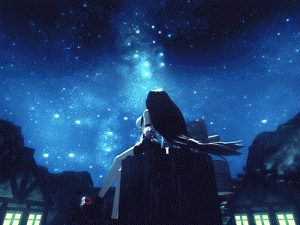
Tifa. Stars. The water tower. The promise. The night under the Highwind. Cloud. The dots are asking to be connected.
For clarification’s sake, Tifa is indeed referring to the stars here, and not to the planet they are standing on. Though the Japanese word “hoshi” (星) can refer to any celestial body, and is also used in the game to refer to the planet the story is set upon, the term typically refers to stars when used in the plural form as “hoshi tachi” (星たち). This is how the word is used here by Tifa in the Japanese text of the game: ねえ、クラウド……私たちの声を、星たちも聞いててくれると思う? 頑張っている私たちの姿を見ていてくれると思う?
“Tachi” denotes a plurality, as in “watashi tachi” (私たち) within the same line (“watashi” means “I,” so a plurality of it means “we”).
Despite the inarguable proof, counterarguments that something romantic actually occurred between Cloud and Tifa on that night are yet perpetuated.
Most commonly, the claim is that the quotes about the feelings shared between Cloud and Tifa don’t identify the type of feelings being shared and confirmed between the two — and could, thus, be any kind of feelings. Or that when the feelings are specifically identified as mutually favorable, they are only done so in the context of passages describing the player-determined outcomes of the scene.
Accompanying this claim, the quote from pg. 198 of the FFVII Ultimania Omega is usually also mentioned:
—
Night before the final battle……
After stopping Hojo’s recklessness and before heading to the Northern Crater, the conversation scene with Tifa can diverge drastically depending on Tifa’s affection rating. When the affection rating is low, the conversation of the scene where the two spend the evening is candid/apathetic and rather short. In the scene on the bridge the next morning, Tifa asks ‘Were you listening?’ and taps her foot. On the other hand, if the affection rating is high, the two spend the evening in focused conversation, and on the bridge, Tifa asks ‘Were you watching?’ and collapses in embarrassment.[Caption for the screenshot of Cloud saying “This is probably the last time we’ll have together……”]
When the degree of affection is high, the night passes meaningfully between the two……
—
The claim is then expanded to say that the mutual feelings Cloud and Tifa confirmed could either be a) feelings of mutual romantic disinterest; b) romantic interest on Tifa’s part tempered to disinterest because she knows Cloud is in love with Aerith instead; or c) feelings of support for one another.
Even the blatant terms in which the contents of the “For the One I Love” page are phrased — wording that states a romantic scene occurred, rather than wording that emphasizes or even mentions the optional events available to the player — get ignored due to the screenshot caption referencing pg. 232, where the “Deviation” sidebar about the low affection version is found.
That first argument is obviously baseless given that we know Tifa loves Cloud and is interested in him. We know this for so many reasons. FFVII shows us this. On the Way to a Smile: Case of Tifa shows us this. Advent Children shows us this. More than one Ultimania tells us this — e.g. Cloud’s profile on pg. 37 of the FFVII 10th Anniversary Ultimania (pg. 39 of the Revised Edition), Tifa’s profile on pg. 194 of the FF 20th Anniversary Ultimania File 1: Character guide, and the character flowchart on pp. 218-219 of the FFVII Ultimania Omega:
(pg. 37 of the FFVII 10th Anniversary Ultimania; caption beside picture of Cloud and Tifa on the date at the Gold Saucer; translation from TheLifestream.net)
“Both Aerith, who is forthright, and Tifa, who is demure, have feelings for Cloud but he is none the wiser to them.”(pg. 194 of the FF 20th Anniversary Ultimania File 1: Character guide; caption beside picture of Cloud and Tifa on the date at the Gold Saucer)
“She is shy when it comes to love. She’s getting better at plainly expressing her feelings to Cloud, though, and can do so more easily now.”(pp. 218–219 of the FFVII Ultimania Omega; arrow running from Tifa to Cloud)
“Favors”Japanese text (in order of reference):
積極的なエアリスとひかえめなティファ。ふたりの心にクラウドはなかなか気づかない。 恋愛に関しては奥手。クラウドに想いを寄せながらも素直になれず、なかなか気持ちを伝えられずにいる。 好意
The second claim is equally ridiculous. If Tifa’s interested in Cloud then she’s interested in Cloud. Not being interested in a relationship with a man who loves another woman until his affections turn to you isn’t equivalent to not being interested in a relationship with the man. It means you’re interested in a relationship with him right now and want things to change right now. In other words, there’s nothing mutual about the feelings in a situation like that.
For that matter, this second claim assumes as its premise the unverified condition that Cloud is in love with Aerith. That in itself is a counterclaim in need of support, and cannot be used as reasoning for a conclusion saying the same thing.
Both claims addressed here also fall short given that “communicate their feelings” and “reveal their feelings” are used in Japanese the way “realized their feelings for each other” is in English. Not to mention that it’s simply absurd that a scene would even be needed for two characters who aren’t interested in each another to confirm their romantic indifference for one another on the eve of global apocalypse.
As TheLifestream.net forum member Octorawk put it:
—
… How ridiculous it would be for them to “confirm friendship”:Tifa: “Cloud…..there has been something I wanted to tell you.”
Cloud: “Yes, I’ve been meaning to tell you something too …”
Tifa: “Cloud, you’re a really good friend.”
Cloud: “Yup, you too Tifa … Gee … I hope we don’t die tomorrow. Nighty night.”
Or “confirm mutual disinterest”:
Tifa: “Tonight may be our last night alive, so I think we should get one thing straight.”
Cloud: “Yes.”
Tifa: “I’m just not into you, Cloud. I just thought I better tell you that. Cos’ it would be awkward to spend the last 24 hours of my life thinking you thought I liked you.”
Cloud: “Yeah, don’t worry about it, I’m not interested in you either. I’m glad you said it, because it would have been weird.”
Tifa: “Phew… Well, that’s a load off …… Well, then. Goodnight, Cloud.”
Cloud: “Nighto.”
Seriously, If you were watching a film and something like that happened, you’d walk out of the theatre and demand your money back.
—
Such a course of events would be made all the sillier when looking at the overall Compilation of FFVII and what decisions Cloud and Tifa make immediately following the events of FFVII. Made in light of those, here’s an equally humorous riff on the notion by two other forum members, Isabella and Vendel:
—
After all they’ve been through together, Cloud and Tifa have a meaningful night in which they discover … they’re friends. And this realization leads them to live together.C&T are officially the dumbest characters ever put out by SE.
—
—Isabella—
“Tifa, I like you so platonically that I just have to live with you.”“Oh, Cloud … I do so enjoy your company … Let’s adopt!”
—
—Vendel
However, as we’re not going into the rest of the Compilation just yet, we’ll instead focus on the fact that Cloud and Tifa aren’t shown confirming any feelings in the Low Affection version of the Highwind scene to begin with. Cloud hardly says anything, after all, whereas in the High Affection version, he’s extremely forthcoming (for Cloud, anyway), left unable to even find words to properly express himself.
Granted, he and Tifa do speak of supporting one another. That claim is true. Tifa says, “But that’s all right, even if no one comes back. As long as I’m with you… As long as you’re by my side… I won’t give up even if I’m scared.” The next morning, Cloud references this when he says, “It’s all right, Tifa. You said so yourself yesterday. At least we don’t have to go on alone.”
It’s even been asserted before that Cloud’s last monologue in the diary-like entries from the Kaitai Shinsho The Complete guide (pg. 182) is evidence that the canon outcome for the Highwind scene is the lower affection version, with the two only confirming feelings of support for one another. Ignoring for now the questionable canonicity of the diary entries from the Kaitai Shinsho (see TheLifestream.net’s guide to FFVII canon), the basis for the above claim is this monologue:
(translation by hitoshura)
—
[Cloud: To the final battle]
I can feel it … from up north. He’s storing up some unbelievably powerful energy —The path of destruction might be the only one left for us, no matter how much we struggle. We might just die a little before the planet, without Holy activating …
Even so, I have to fight. To settle my past. To be myself. And, above all — tofree her frozen smile.
And Tifa’s here for me. I’m not fighting alone, that’s what Tifa taught me—
Everyone came back. Barret, Cid, Red XIII … Cait Sith taking part by remote control, while evacuating the citizens of Midgar. Vincent, who despite his cold attitude is really hiding a burning fighting spirit. Yuffie, who put up with her motion sickness and came back.
Everyone each has their own reasons to right. And they’re all tied to the life of the planet.
Let’s mosey, to the Northern Crater!
She left us hope, now we’ll release Aerith’s wish!
—Japanese text:
—
[クラウド:最後の戦いへ]
感じるんだ……北の果てから。あいつが、とてつもなく強いエネルギーをたくわえているのが――。どうあがいても、俺たちには滅びの道しか残されていないのかもしれない。ホーリーを発動させることなく、星よりもちょっと前に死ぬだけなのかも……。
それでも、俺は戦わなきゃならない。過去と決別するために。俺が俺であるために。そして、何よりも――凍てついた彼女の微笑を溶かすために。
それに、ティファがいてくれる。俺の戦いは孤独じゃないんだって、ティファは教えてくれる――。
みんなも帰ってきれくれた。バレットも、シドも、レッドXIIIも……。ミッドガルの市民を避難させながら、遠隔操作で参加してくれるケット・シー。さめた態度だけど、本当は熱い闘志を秘めたヴィンセント。乗り物酔いをおして、もどってきて くれたユフィ。
みんなそれぞれ、戦う理由を持ってる。そしてそれは、星の命へとつながっている。
行こう、北の大空洞へ!
俺たちに希望を残してくれた、エアリスの想いを解き放つために!
—
In the first place, I would argue that this entry is assuming the High Affection scene took place because of its reference to it as such in the Analects of Tifa section of her profile from the book, as quoted earlier.
More than that, though, the problem with this claim about friendship and support, quite simply, is that there’s no element of revelation in it, nor any need for confirmation of it. Cloud and Tifa had been supporting one another since before the beginning of the game, when she found him semi-catatonic at the Sector 7 train station.
They already knew they were there for one another — and not just in battle. Even with how slow on the uptake Cloud can be at times, if he didn’t pick up on the fact that she — and the rest of his comrades, for that matter — supported him emotionally when they stuck by him and encouraged him to journey on after he beat Aerith up and began to doubt himself, then he should have known it when Tifa helped him piece his shattered psyche together in the Lifestream. And even if not quite then, Tifa and the rest of AVALANCHE welcome him back with open arms after he recovers his memories, despite him having been Sephiroth’s puppet who allowed the villain to cast Meteor.
Cloud, as well, had supported Tifa. He participated in the second mako reactor mission because she reminded him of the promise he had made to her. He infiltrated Don Corneo’s mansion to rescue her. And before giving Sephiroth the Black Materia the second time around, he apologized to everyone — but he singled Tifa out for his greatest apology, and offered her encouragement that someday she might meet the “real Cloud.”
So, was it almost the end of the game when they realized and confirmed feelings of support to each other?
No, the two of them had definitely confirmed friendship and support of one another well before the end of Disc 2. There’s no argument to be made for them confirming such feelings in the Low Affection version of the Highwind scene — a version which, again, was said to have a conversation *lacking* in feeling.
Before we get too far from the “mutual disinterest” arguments, by the way, even if one wants to argue — as has actually happened — that taking advantage of the game’s affection ratings system to lower Tifa’s affection for Cloud allows one to change how she feels about him, this does not actually change how she feels about him in the narrative. The Ultimania pages referenced a few paragraphs above that speak to Tifa’s feelings for Cloud clearly apply regardless of an optional game mechanic.
Seriously, we know Tifa digs Cloud. The player making use of an inherently illogical, completely arbitrary game mechanic (more on that in a moment) to lower Tifa’s affection rating for Cloud to something slightly less doesn’t change that — as far as the actual story is concerned — she still wants him. That she is in love with him is obvious, even in the Highwind scene’s lower affection version.
For that matter, Cloud doesn’t have an affection rating. His feelings are static (more on that soon as well). It is Tifa’s — as well as Aerith’s, Barret’s and Yuffie’s — affection for Cloud that can be manipulated.
By those who have taken that route, it has also been argued that the player, in the role of Cloud, influences the affection ratings of those he favors and doesn’t favor as a reflection of his own preferences. In other words, if a character’s affection rating for Cloud goes up, it’s because he favors them and shows this through his behavior.
In response, one must ask if Cloud, then, tells Tifa to be strong at the end of the mission at the No. 5 mako reactor in order to show off for Barret (that choice adds +1 to Barret’s affection rating for Cloud). Does he give Barret’s daughter a flower in order to impress him (+5 for Barret)? Does he tell Don Corneo that he has a boyfriend named Barret because he truly feels that way (+5 for Barret) — and even if so, why does a conversation Barret never hears increase his affection for Cloud?
Similarly, why does telling Jessie “Looking forward to it” during the train ride following the game’s opening mission lower Tifa’s affection rating by three? What does that have to do with Tifa? Not only is she not present for the conversation, but the player hasn’t even met her yet.
How about getting to the last train car before lockdown during the No. 5 reactor mission? Why does that give Tifa and Barret’s affection values five points?
Why does saying “I don’t know if I can hold on” at the end of that mission give Tifa’s affection rating one point?
If Aerith is chosen as Corneo’s date, why does saying “We’ve gotta help Aerith!” increase Tifa’s affection value (+3), while asking her if she’s alright lowers it (-2)? That one in particular is completely counterintuitive.
Why does who accompanies you to Barret’s fight with Dyne affect anything at all (+10 for Aerith, +3 for Tifa, +2 for Yuffie)? For that matter, in terms of the narrative, shouldn’t everyone have gone along?
Does Cloud push the wrong barrels in the church after meeting Aerith to make her not like him (-3 for each wrong barrel)? Or does her affection for him increase or decrease regardless of his motivations and intentions? Spoiler alert: it does.
If the affection ratings can change independently of Cloud’s affections, then haven’t we lost sight of the premise we began to argue for in treating Tifa, Aerith, Yuffie and Barret’s affection levels as a reflection of Cloud’s own? For that matter, in the FFVII 10th Anniversary Ultimania interview referenced earlier in this analysis (pg. 11 of both editions of the book), Yoshinori Kitase commented that one of the contributing factors to the popularity of FFVII’s characters was “having 2 heroines, Aerith and Tifa, and having the hero waver between them, that was something new” (translation by hitoshura).
Japanese text:
—
エアリスとティファというふたりのヒロインがいて、主人公がそのあいだで揺れ動くという設定も、当時としては新しかった。
—
That Kitase thinks in terms of a love triangle rather than a love pyramid is sufficient on its own to show that the affection ratings are a fun diversion only — not a reflection of or determinant factor in the actual story.
If the affection ratings actually have narrative impact, as well as reflect Cloud’s feelings, why can one get someone other than Tifa for the date at the Gold Saucer, yet still get the High Affection Highwind scene? For that matter, why can one get Tifa for the Gold Saucer date — which would require her affection rating for Cloud be the highest among the four candidates — and still get the lower affection Highwind scene? Does he stop liking her halfway through the game?
Most importantly of all, why treat an inherently illogical, completely arbitrary game mechanic as a reflection of the narrative?
Perhaps more importantly, in fact: Where is this version of the lower affection scene in which Tifa and Cloud would express romantic disinterest? Where is it to be found?
It simply does not exist. No matter how many times one plays through FFVII, and no matter how low Tifa’s affection rating may be, they will never — short of modifying the PC version of the game — come across such a scene.
TheLifestream.net and Cloud x Aerith forum member JayM once made the following valuable observations:
—
So this isn’t a super-short post, I’m going to throw my hat in with the people who think the explanation of the LA HW scene is implausible. We see the entire LA HW scene (unless there’s more talking after the fade to black? But I thought it was implied to be short?). So the dialogue being mentioned could not have happened. Regardless of the feelings between the two characters, or the intentions of the creators, this “just friends” conversation did not exist in the narrative text of the LA HW scene.…
—In order to make this argument, you guys’ve gotta prove
1. That the conversation went beyond what we saw
2. That the theorized extended dialogue was a confirmation of friendship. And if you want to really make this a point FOR Clerith
3. That the reason Cloud would only want to be friends is because he is in love with Aeris, to the exclusion of being in love with Tifa.IMO this is a really convoluted way to work around to arguing that Cloud loves Aeris, and I think getting past point one will be incredibly difficult, much less getting to point three. I’d let this one go. CloTi doesn’t invalidate the existence of Clerith; you don’t need to disprove it to argue for Clerith.
—
Along a similar vein, Master Bates made the following comment:
—
Actually, I am more curious how the LA version somehow translates to Cloud is still in love with Aerith when the latter isn’t even included nor mentioned in that scene. There wasn’t even any reference to her, so how does that make getting the LA scene means Cloud loving Aerith?
—
To summarize the matter, the lower affection scene ends when Cloud suggests that he and Tifa should get some sleep, and she agrees. One can argue until blue in the face that a conversation concerning “mutual disinterest” could have come up during the night, but — referring back to the quote from pg. 198 of the Ultimania Omega — how does it make sense for a scene said to be “rather short” to continue on for a longer, more significant conversation after the fade-to-black than it did prior to the fade?
The fade out at the end of the lower affection scene can’t be likened to that in the higher affection version. The latter is a discretionary shot that has been explicitly identified in official materials as providing a segue past a physically intimate moment; the former is the end to a conversation, not a prelude to more communication to follow.
Both scenes fade out, sure, but for different reasons. One fades out because Square wasn’t prepared to depict a scene of physical, romantic intimacy, while the other fades out because watching people sleep is boring.
In any case, how would a conversation in which Cloud and Tifa discuss not being romantically interested in one another not qualify as having deep subject matter, as the higher affection scene is said to contain on pg. 232 of the FF 20th Anniversary Ultimania File 2: Scenario guide?: “If her affection value is high, the content of their conversation will be deep, showing that they strongly care for each other.”
For that matter, wouldn’t any conversation about Cloud and Tifa’s feelings for each other qualify as containing deep subject matter, regardless of whether their feelings were romantic or the feelings between best friends? And, as TheLifestream.net staff member Ryushikaze has commented, “Scenes without feeling cannot be scenes in which mutual feelings are confirmed.” There is no such confirmation in the Low Affection version of the Highwind scene. Period.
Put even more simply, the bottom line here is: There can’t be any confirmation of feelings in a scene that doesn’t involve Cloud reciprocating Tifa’s digging of him. This is common sense.
Another common counterargument to the canon status of the High Affection scene is that, due to the scene being subject to player control, it can’t be said to have a canon outcome at all. This argument is even less grounded than the previous due to a great many scenes subject to player influence in FFVII and other Final Fantasy titles having officially confirmed results.
While not every optional element of any Final Fantasy can be said to have a confirmed outcome, there is a simple, logical set of criteria we can follow to conclude if such an outcome exists. If the consequences of a particular outcome are shown to be in play in a chronologically subsequent title, or shown to be in play in an official book’s description of later events, then that’s how things went down. Also, if a particular version of events is outright said/shown to have occurred, then — unless the matter becomes messy due to inconsistencies — that’s also how things went down.
Examples of the former include Yuffie and Vincent joining AVALANCHE, Clasko being influenced by Tidus in FFX to become a chocobo breeder in FFX-2 (despite the player having the option in the first game to inspire him to remain a knight), the choices in X-2 that lead to Tidus’s resurrection in the game’s ending, and Shadow surviving the events of the Floating Continent in FFVI.
Examples of the latter criterion being met include Terra’s revelation about love (discussed on the “For the One I Love” page, as well as on pg. 186 from the same book, in FFVI’s Story Playback), FFV’s official ending being the one in which everyone in the party survives the final battle (featured at the end of that game’s Story Playback section on pg. 155 of the same Ultimania), and Tidus returning in X-2’s ending (on pg. 391; the Story Playback for that even shows a screenshot of he and Yuna together along with a caption for it saying “Tidus is resurrected in the ending movie, in a connection to the very end of the previous work’s ending” — ティーダが復活するエンディングのムービーは、前作のエンディングの最後からつながっている). The High Affection Highwind scene is also an example of this brand of confirmation, as we’ve observed at length.
Among the options discussed above, several are also filed under “Deviation” headings in the Ultimania, just like the Highwind scene received. Examples include Clasko’s profession (“Deviation” heading entitled “The Path Clasko Takes”/クラスコの進む道 found on pg. 353), Shadow being left behind on the Floating Continent (“Deviation” heading entitled “The Life and Death of Shadow”/シャドウの生死 found on pg. 183), and the optional decisions in FFX-2 that lead to Tidus’s return (“Deviation” headings entitled “Preparation for the Ending”/エンディングへの布石 on pp. 387, 388 and 391).
Also worth pointing out is that two of FFVI’s own four “Impressive Scenes” selections on pp. 160 and 161 were optional or contained optional elements, like the High Affection Highwind scene. The first of these is the scene depicting Terra’s revelation about love. The second is the Returners all confronting Kefka for the game’s final battle. The Highwind scene is not alone in being a mercurial event with a specific outcome chosen as one of the most memorable scenes for its game.
Many events in FFVII and other Final Fantasy titles are subject to player control or influence, but still have canon outcomes.
For instance, in Final Fantasy XIII, a line in Vanille’s narration of Chapter 1 (“You said you liked my smile”) references an optional event that takes place in Chapter 11, where Hope mentions that Vanille’s smile makes him feel happy (YouTube upload courtesy of DavidGamesHD).
This cutscene can be easily missed if the player doesn’t go to the specific spot in Gran Pulse that triggers it. Even as an optional scene that the player may never see, it has a reference in the main body of the narrative before ever being available to the player.
In a similar case, Maechen from FFX can be completely ignored by the player during the course of play in that game. In FFX-2, however, during a conversation between he and Yuna, Maechen will comment that he conversed with Tidus on a number of occasions.
For an example closer to home, before Sephiroth casts Meteor in FFVII, the player has the option of leaving the Black Materia with either Red XIII or Barret for safekeeping. Despite this, all official sources on the matter depict Cloud as choosing Red XIII, just as all official sources speak of the High Affection Highwind scene taking place.
Sources included in this matter with Red XIII are pp. 179 and 183 of the FFVII International Memorial Album, pp. 35 and 165 of the FFVII Ultimania Omega, pg. 227 of the FF 20th Anniversary Ultimania File 2: Scenario guide, Reminiscence of FFVII and pp. 57 and 115 of the FFVII 10th Anniversary Ultimania (pp. 59 and 117 of the Revised Edition).
With regard to pg. 35 of the FFVII Ultimania Omega and the first reference from the FFVII 10th Anniversary Ultimania mentioned above, the event in question is even included on Red XIII’s personal timelines from his profiles in both books, while neither Barret’s personal timeline from the FFVII Ultimania Omega nor his personal timeline from the FFVII 10th Anniversary Ultimania speak of the matter as including him with the definite phrasing used in Red’s entries:
(pg. 35 of the FFVII Ultimania Omega)
—
When he receives the Black Materia from Cloud, the weight of the responsibility makes him shuffle. When he then loses sight of his comrades due to Sephiroth’s illusions, he goes into a state of near panic.
—Japanese text:
—
クラウドから黒マテリアを預かった場合、責任の重さにビクビク。セフィロスの幻覚で仲間の姿を見失ったときは、なかばパニック状態になる。
—(pg. 57 of the FFVII 10th Anniversary Ultimania; pg. 59 of the Revised Edition)
—
Entrusted with the Black Materia by Cloud, then tricked by Jenova mimicking Tifa, allowing Meteor to be invoked.
—Japanese text:
—
クラウドから黒マテリアを預かるも、ティファに擬態したジェノバにだまされ、メテオ発動を許してしまう。
—
In fact, Barret’s timeline from his profile in the FFVII 10th Anniversary Ultimania (pg. 20) speaks of the matter in which he is left with the Black Materia as indefinite and subject to change:
—
During the event immediately following the recovery of the Black Materia, where some of the party wait on standby while Cloud and the others proceed into the Great Northern Cave, there are times when Barret is left with the Black Materia for safekeeping. Although he says “…Pressure’s on now” and is careful, he is easily deceived by Jenova when it assumes Tifa’s form and delivers the materia to Cloud, who became Sephiroth’s puppet.
—Japanese text:
—
黒マテリアを奪還したのち、クラウドたちと一緒に大空洞の奥まで行かずに待機した場合、バレットが黒マテリアを預かることがある。「責任重大だぜ」と大事に持っているが、ティファに化けたジェノバにあっさりだまされ、セフィロスの人形と化したクラウドに渡してしまう。
—
Meanwhile, in the Story Playback section later in the book, on pg. 163 the matter of whom the materia gets left with is discussed as optional, but it is then shown to be Red XIII on pg. 165:
—
The Black Materia is Handed to Another Party Member After the Jenova-DEATH battle, the Black Materia is recovered and it is decided to leave it with either Barret or Red XIII before proceeding. Whoever the Black Materia is left with will speak to Jenova while it mimics Tifa, then rush off to rejoin Cloud on that pretense.[Screenshot caption of Red XIII saying “You want me to take the Black Materia? ……all right, I understand”]
When left with Red XIII. His nervous words and twitching are kind of cute.
—Japanese text:
—
黒マテリアを預けた相手
ジェノバ・DEATH戦後に入手した黒マテリアは、先へ進む前にバレットかレッドXIIIに預けることになる。ここで黒マテリアを預かった者が、ティファに擬態したジェノバと話したり、クラウドのもとへ駆けつけたりするのだ(P.166,167)。[Screenshot caption of Red XIII saying “You want me to take the Black Materia? ……all right, I understand”]
レッドXIIIに預けた場合。心細げな言動がちょっとかわいい。
—
Likewise, the Story Playback section of the FFVII 10th Anniversary Ultimania also features Red XIII as the party member chosen to safeguard the Black Materia (pg. 115; pg. 117 of the Revised Edition), and, as mentioned, the script of the game included in the FFVII International Memorial Album (pp. 179 and 183) once again shows Red XIII to be the recipient of the Black Materia, as does Reminiscence of Final Fantasy VII.
Returning briefly to a previous example, the scene with Terra mentioned on the “For the One I Love” page (“Also, in ‘FFVI,’ there’s the scene where Terra recovers her ability to fight and comes to understand the emotion called ‘love’; when talking about ‘love,’ this is a scene that shouldn’t be left out”) was altogether an optional scene, rather than unavoidable-yet-malleable like the Highwind scene. Thus, it is subject to the player’s control whether it appears in their playthrough of the story at all. And even so, it’s all treated as something that definitely happened, both on that page and in FFVI’s Story Playback within the same book (pg. 186).
For that matter, even leaving Shadow behind on the Floating Continent in FFVI is in the sidebar of FFVI’s story summary under the “Deviation” heading (pg. 183) called “The Life and Death of Shadow.” Yet recruiting him back into the Returners at the Coliseum later is mentioned in the main body of the story recap (pg. 187), he’s shown among the Returners when they confront Kefka for the final battle on pg. 191, he’s included in the ending screens and description on the same page, and he’s included in the script of the scene in which the Returners confront Kefka for the game’s showdown — text from Shadow included — in one of the FFVI Story Playback’s four Impressive Scenes on pg. 161. These are things that can’t be done if he’s left on the Floating Continent.
Re-recruiting Relm in Jidoor is also mentioned in the main body of the story summary (pg. 187), while finding her in the Veldt cave is mentioned under the same kind of “Deviation” heading (in this case, “In the Event that Shadow died …”/シャドウが死んでいた場合は…… ). It is also identified as a consequence of the player choosing to leave Shadow behind.
As you can see, there are several scenes – and from more than just one of the games — that have a “Deviation” sidebar yet still have canon outcomes that are mentioned in the main body of their respective games’ story summaries in the FF 20th Anniversary Ultimania File 2: Scenario. The Highwind scene is simply another one of them.
Yet another common counterargument against the High Affection Highwind scene being canon is the observation that the FF 20th Anniversary Ultimania File 1: Character guide identifies Cloud and Tifa as “osananajimi”/幼なじみ (“childhood friends”) rather than identifying them as a couple or showing them with a mutual “favors” arrow on its character relationship chart for FFVII (pp. 190-191; scans courtesy of Celes and Balthea), “favors” (“koui”/好意 in Japanese) being a euphemism for “love” in that language, as seen in this definition for the word from the Goo Japanese Dictionary:
(translation by hitoshura)
—
Koui
The feelings of friendship and affection. Also used as a euphemism for love.
—Japanese text:
—
こう‐い〔カウ‐〕【好意】
その人にいだく親しみや好ましく思う気持ち。愛情の婉曲的な表現としても用いられる。
—
This word was (scans again courtesy of Celes and Balthea) used in the case of Celes and Locke for Final Fantasy VI’s chart (pp. 148-149) and for Squall and Rinoa on FFVIII’s (pp. 232-233).
This same argument regarding these charts has recently been expanded to include the chart for FFVII on pg. 15 of the Final Fantasy 25th Memorial Ultimania Vol. 2, released on December 18, 2012 — the 25th anniversary of the first Final Fantasy game’s release to the public. That chart uses identical markers to those seen in the previous book, as does its chart for FFVIII (pg. 121).
By not identifying such a couple with regard to FFVII’s charts, however, the books aren’t making a statement that there isn’t a couple to be determined from the game or wider Compilation materials. The chart isn’t taking into account the entirety of the Compilation, nor even the entirety of the original game for that matter.
On both book’s charts, the line going from Cid to Shera says “tsuraku ataru” (つらく当たる/つらくあたる) — “to treat cruelly/unkindly.” Compare the chart above to this one from the 25h Memorial Ultimania Vol. 2.
Furthermore, the description is rendered in the present ongoing tense, not past tense, which would be “tsurakau atatta” (つらく当たった). It’s not true that Cid treated her unkindly by the end of Disc 2, where the Highwind scene occurs. As well, the chart obviously doesn’t mention that Cid and Shera are married by the time of Dirge of Cerberus, so there clearly is a point where these charts stopped keeping track of what was going on.
Not even Advent Children and DC’s own charts in the FFVII 10th Anniversary Ultimania (pp. 121, 133; pp. 123 and 135 in the Revised Edition) provide any greater illumination on the matter of who Cloud is in love with, lacking “koui”/”favors” arrows altogether. DC’s chart doesn’t even have an arrow or line of any sort running from Cloud or Tifa to the other, while AC’s has them again identified as “childhood friends,” no arrow from Aerith to Cloud, and the only arrow from Cloud to Aerith reading “tsumi no ishiki” (“sense of guilt”/罪の意識) — the same arrow running from Lucrecia to Grimoire Valentine on DC’s chart.
Furthermore, this book’s chart for the original game (pg. 109) doesn’t so much as include “koui”/”favors” arrows from Aerith and Tifa to Cloud — unlike the flowchart in the FFVII Ultimania Omega (pp. 218-219) — nor does even its DC flowchart include the fact that Cid and Shera are married during that game.
More telling still, the charts for Before Crisis, Last Order and Crisis Core (pp. 147, 159 and 163 respectively; pp. 149, 161 and 165 of the Revised Edition) only identify Cloud and Tifa as “childhood friends,” despite it being otherwise established in canon that Cloud and Tifa had a mutual interest in one another as teenagers, even if unknown to either.
The argument has also crept into the debate that Cloud and Aerith’s relation to one another on the Advent Children chart reflects an evolution from FFVII to its sequel while Cloud and Tifa’s relation to one another does not.
In addition to the absurdity of a one-way arrow running from Cloud to Aerith that says he blames himself for her death somehow reflecting an evolution in a reciprocal relationship between them, one really must ask how Zack got demoted from FFVII to Advent Children when he was already dead before either of them began. Why are he and Cloud “best friends” (親友) on all original game charts and all pre-original game charts, yet are suddenly described with “katsute no shinyuu” (“one-time best friends”/かつての親友) ”one-time best friends” for a chart in the same book based two years after the original game?
What kind of “evolution” is being reflected here?
To argue that Cloud and Tifa’s relationship has not evolved in any manner plainly ignores the numerous official statements that outright tell us their relationship to one another has evolved. For that matter, there is at least one post-original game interrelations chart that does mention Cloud and Tifa with something other than “childhood friends.”
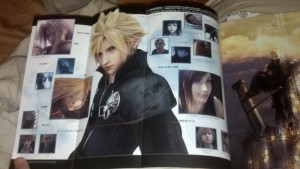
The Advent Children Prologue book included a fold-out poster with Kadaj, Yazoo and Loz on one side; a “Human Relations of Final Fantasy VII Advent Children” chart on the other. It offers the following descriptions:
—
[Between Cloud and Sephiroth]
“Connection from the past”
過去からの因縁[From Sephiroth to his Shinentai]
“Influencing?”
影響?[From the Shinentai to Sephiroth]
“Sense his presence?”
存在を感知?[From Kadaj to Cloud]
“Regard as an enemy”
敵視[Between Rufus and Kadaj]
“Hostility”
対立関係[Between Rufus and Cloud]
“Former enemies”
過去に対立[Between Shin-Ra and Tifa]
“Mutual interests with regard to Kadaj and co.”
カダージュたちに対して利害が一致[From Cloud to AVALANCHE]
“Comrades fought alongside 2 years ago”
2年前ともに戦った仲間[From Cloud to the Seventh Heaven family (Tifa, Denzel and Marlene)]
“Living with”
共同生活していた
—
It certainly can’t be called reverse evolution to have gone from “childhood friends” to “living together.”
Further, while the line from Cloud to Tifa here isn’t a direct one and she is one of three people the description applies to, it still applies to her. It can’t be argued that it doesn’t. Besides, drawing three separate lines for each person Cloud is now “living with” is simply unnecessary and wouldn’t be aesthetically pleasing.
Before moving further, the question must now be asked: Does Aerith’s altogether lack of presence on this chart indicate that there is nothing between she and Cloud at this point? Really, where do we stop assigning grand value to these meaningless interrelation charts that are simply a popular thing to include in books in Japan?
Though on Advent Children’s chart in the FFVII 10th Anniversary Ultimania we once again have Cloud and Tifa being identified only with “childhood friends,” that identification really doesn’t preclude them being anything else in addition. Only the arrow running from Cloud to Aerith actually says “sense of guilt,” but we know Cloud has a sense of guilt in Advent Children where Zack is concerned as well. However, the line between the two on this chart only says “katsute no shinyuu” (“one-time best friends”/かつての親友).
While on that topic, we certainly wouldn’t conclude that the only thing Cloud felt for Aerith was a “sense of guilt” on the basis of it being the only information available on that chart. To assume Cloud and Tifa could only be “childhood friends” on the basis of such a diagram is reasoning that would logically lead one to believe Cloud felt nothing about Aerith aside from the guilt.
For that matter, the charts for the other games from the FF 20th Anniversary Ultimania don’t all openly identify eventual couples. The line running between Lulu and Wakka on FFX’s chart (pp. 326-327) identifies them as “osananajimi,” or “childhood friends” (幼なじみ; scan courtesy of Celes and Balthea), the same as Cloud and Tifa are always identified in these charts. Given that Wakka and Lulu married only half a year after FFX ended (this information comes from pg. 583 of the FFX-2: International+Last Mission Ultimania; the relevant text says only “Half a year later”/半年後 and “Wakka and Lulu marry”/ワッカとル―ル―、結婚), “osananajimi” can hardly be considered indicative of people without romantic feelings for one another.
For the sake of full disclosure, however, FFX-2’s chart (pp. 372-373) does identify Wakka and Lulu as “husband and wife” (夫婦).
Further, Tidus and Yuna are identified as an “important existence/person” (“taisetsu na sonzai”; 大切な存在) to one another on FFX’s chart, this construction — and other references to people beginning with “taisetsu na” (e.g. “taisetsu na hito”/“important person”; 大切な人) — generally being used in regard to romantic partners. FFX-2’s chart, meanwhile, identifies Tidus as someone Yuna is “hoping to meet again” (たいと願う):.
Meanwhile, Final Fantasy IX’s chart from the same book (pp. 272-273) links Steiner and Beatrix with “Rivals (later, favors)”/ライバル (のちに好意), Freya and Fratley with “koibitos”/恋人 (see the rest of this analysis for more on this word), and Zidane and Dagger with the “important existence/person” identification (scans again courtesy of Celes and Balthea).
Another chart with incomplete data, however, is that for FFIV, the first Final Fantasy to have a romantic couple together in its main cast. The chart there (pp. 80-81) only identifies Rosa and Cecil with “koui”/”favors” (好意), as was done with Celes and Locke, and then with Squall and Rinoa.
As Cecil and Rosa actually get married in FFIV’s ending — “koui” applied to them before the game even began — this is incomplete data.
Perhaps more telling than any of these is the chart from pp. 10-11 of the FFXII Scenario Ultimania (photo courtesy of hitoshura). On this chart we find Vaan and Penelo described with “relationship just like family” (家族同然の仲), which arguably implies a sibling-like relationship.
However, they are still a romantic coupling.
While many fans did not take note of this fact prior to viewing the secret ending of FFXII’s sequel, Revenant Wings, in which the two kiss as a heart appears above them, it is actually noted in the original FFXII as well, but is simply never a main fixture of the narrative.
While completing the brief sidequest in Rabanastre involving the Wandering Viera who is seeking her soul mate, she will make the following comments at Yamoora’s Gambits in Rabanastre’s North End:
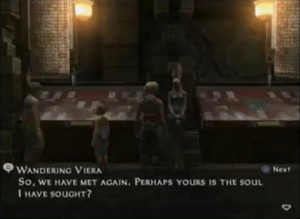
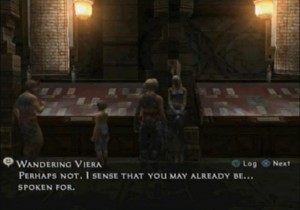
Their status as a couple during that time is further cemented by FFXII art director Isamu Kamikokuryou’s comments about this Art Museum card illustration of Vaan and Penelo he drew for inclusion with the FFXII Potion Premium Boxes:

On pg. 602 of the FFXII Ultimania Omega (scan courtesy of Fangu), we find the following:
—
Vaan & Penelo
(Art Museum card illustration)
Kamikokuryou: Vaan and Penelo on a date in downtown Rabanastre, or maybe they’re just walking around. For the Art Museum card illustrations included with the Potion Premium Boxes, we decided who would draw which characters by way of Rock, Paper, Scissors (laughs). Although I had gotten Balthier & Fran, I got Yoshida-san to switch with me. Since I wasn’t used to drawing people, when I heard this idea, I said, “Are you serious?!” (laughs).
—Japanese text:
—
ヴァン&パンネロ
(アートミュージアムカード用エラスト)
上国料 ラバナスタ・ダウンタウンで、ヴァンとパンネロがデートしているというか、ふたりで歩いているところです。「ポーション」のプレミアムボックス(→P.632)についているアートミュージアムカードのイラストは、誰がどのキャラクターを描くかをジャンケンで決めました(笑)。僕はバルフレア&フランの担当になったんですけど、吉田さんにチェンジしてもらったんです。ふだん人物を全然描かないから、この企画を聞いたときは「マジでやるんですか!?」という感じでしたね(笑)。
—
If it’s as likely such a scene depicts the two on a date as just walking around town, that says everything we need to know.
Along these same lines, the interrelation chart on pp. 12-13 of the FFXIII Ultimania Omega describes Vanille and Fang’s relationship as “relationship just like sisters” (姉妹同然の仲) despite their actual interactions suggesting a far more intimate relationship than this description alone would imply.
Really, the character flowcharts offer us absolutely nothing of value as far as the LTD is concerned.
To argue that any of the charts lacking a “koui,” “suki” or “koibito” arrow running between Cloud and Tifa is a sign that there’s no canon pairing applicable to them is to argue that Cid still treats Shera unkindly by the
end of FFVII, that Cecil and Rosa didn’t marry at the end of FFIV, and that the relationships between Zidane/Dagger and Tidus/Yuna are potentially ambiguous.
In other words, such an argument is unfounded. The charts are not nearly a definitive word on the LTD.
In any case, despite the flowcharts being a void counterargument to a canon Cloud and Tifa pairing, it has been argued that Cloud and Tifa being intimate on that one night isn’t alone enough to indicate that they had begun a romantic relationship by the end of the original game. Fair enough.
However, even on Disc 3 of the original game, short on content as it was, we still see emotional intimacy between Cloud and Tifa.
First, after the Highwind has arrived in the Northern Crater, when the player speaks to Tifa, she says, “Hey, Cloud… Would you tell me ‘It’s all right’?” Though the player has the option to refuse her request, Tifa’s entry in the FFVII Ultimania Omega (pg. 27) tells us what he actually does, as well as provides a commentary of the moment:
—
On Disc 3, Tifa hardens her resolve as they head toward the final battle, but she is unable to suppress her fear. On the bridge of the airship, she says to Cloud, “Would you tell me ‘It’s all right’?” Although Tifa is forlorn and somewhat childish here, when Cloud tells Tifa “It’s all right,” it is heartwarming.
—Japanese text:
—
最後の戦りへの決意を固めたDISC 3でも、内心の恐怖を抑え切れないティファ。飛空艇の操縦室でクラウドが話しかけると、「『だいじょうぶ』って言って?」と頼んでくる。心細げだがどこか甘えたふうなティ ファと、「だいじょうぶ」と答えたときのクラウドの様子が、微笑ましい。
—
In addition to this moment on the bridge of the Highwind, if Cloud and Tifa accompany Red XIII during the sequence in which the party returns to Cosmo Canyon and Bugenhagen dies, afterward they will be sitting together at an intimate distance by the Cosmo Candle:

This also isn’t Cloud and Tifa’s default positions from the earlier scene on Disc 1 where the party was gathered around the fire either, so it was specifically animated such that Cloud and Tifa would be sitting together.
As can be seen in the following screenshots, none of the other party members will be positioned nearly so close to Cloud as Tifa if they are the third party member:
Official materials also emphasize Tifa being the one to accompany Cloud and Red XIII for this scenario, as she is the one waiting with Cloud in the FFVII Ultimania Omega’s Story Playback section (pg. 203) and in Red XIII’s personal timeline on pg. 58 of the FFVII 10th Anniversary Ultimania (pg. 60 of the Revised Edition).
For the sake of argument, however, we’ll pretend Disc 3 was devoid of this content and even that the book that put their relationship alongside the likes of Squall/Rinoa and Tidus/Yuna didn’t do so. There are then a number of reasons for Cloud and Tifa to have had such an intimate moment at the end of Disc 2 without it necessarily reflecting the intention to begin an ongoing relationship, as they were possibly too focused on the battle ahead at that point to even weigh it in such a capacity anyway.
Truly, it is only once the conflict has been settled that we see Cloud addressing how he wants to live afterward — and that comes only in the newer Compilation materials. We’ll get to that momentarily.
Before that, a final counterargument related to the Highwind scene exists in the form of a line on pg. 189 (Revised Edition) of the Final Fantasy VII Kaitai Shinsho The Complete guide book. In the section describing the different scenes that can emerge as a result of Cloud’s affection rating is a paragraph related to the Highwind scene.
Here, a line says, “At this time, depending on Cloud’s affection rating for Tifa, the 2 events involving ‘dialogue exchanged between them from dusk to dawn’ and ‘Tifa’s lines and reaction to learning that everyone may have seen (or heard) that situation’ will be different.”
The same line has been translated by Chibica of the Cloud x Aerith forums as, “At that moment, according to Tifa’s affectional rating for Cloud, the event of ‘dialogues exchanged between them from dusk to dawn’ and ‘Tifa’s reaction and lines when she found out that everyone might see (or hear) that circumstance’ will be different.”
From this, some have taken the meaning that Cloud and Tifa talked from dusk until dawn — the implication being that there was no sexual interaction between them. This, however, is a misreading of the line.
The line refers not to an instance of Cloud and Tifa talking from dusk until dawn, but, rather, to the dialogue they happen to exchange between dusk and dawn. At dusk, they have a conversation where the lines are affected by Cloud’s affection rating for Tifa. At dawn, they talk again and their lines are again affected by the rating.
To better explain, if reading a newspaper article about a report on crime patterns, you wouldn’t read a phrase like “this report is based on a study of crimes committed from August to December” to mean that the specific crimes analyzed began in August and lasted for four months. In other words, you wouldn’t take it to mean a single mugging, burglary, etc. had lasted for four months.
Such a phrase would refer to different instances of crime that occurred over that four-month period — thus, “August to December.” The same is true in the matter of Cloud and Tifa beneath the Highwind.
What we’re dealing with in “dialogue exchanged between them from dusk to dawn” doesn’t indicate a conversation that lasted from dusk until dawn. Rather, it identifies instances of dialogue that occurred at dusk and at dawn.
In addition, the line is speaking of the dialogue that occurs in *both* versions of the scene, not one or the other. We know from simply watching either the High Affection or Low Affection versions of the scene that Cloud and Tifa do not talk from dusk until dawn in either.
In the Low Affection version, Cloud suggests the two go to sleep shortly after their conversation begins. And in both versions, Cloud awakens Tifa shortly before dawn, meaning there was no conversation between them throughout the entire night.
That being the case, this counterargument also falls short — especially given the declaration that Cloud and Tifa’s expression of feelings to one another didn’t involve words.
In any case, as said before, even with the two having sex, some would argue that — this being the night before they journeyed to face Sephiroth — it was just two people in the throes of passion before they died. Not a declaration that they wanted a life with one another, but — on Cloud’s part anyway — a giving and taking of comfort offered before the end.
Alright, fair enough.
However, an earlier line in the original game suggested that Cloud’s childhood interest in Tifa had carried over to the present. During the Lifestream Sequence beneath Mideel on Disc 2, Tifa reveals to Cloud’s subconscious that she had thought of him a lot after he left Nibelheim as a teenager, wondering how he was doing and whether he’d managed to get into SOLDIER.
In response to this revelation, Cloud’s subconscious says, “Thanks, Tifa. Tell him what you told me, later. He’ll probably be so happy.”
In the Japanese script of the game, these lines were actually: “Thanks, Tifa. Later, tell him. He’ll be delighted for sure!” — 後で、こいつに言ってやって。きっと喜ぶよ. The word “kitto” (きっと) was used in the Japanese script, meaning “for sure,” “certainly” or “udoubtedly.” As well, the sentence ended with “yo,” adding the emphasis that an exclamation point would in English.
For the record, “probably” in Japanese is “tabun” (たぶん).
This suggests that — even at this point — Cloud would be happy to hear that Tifa had been interested in him when he was into her as a teenager. Given that Tifa had been Cloud’s primary reason for wanting to join SOLDIER in the first place (“I thought if I got stronger I could get someone to notice………”), it’s safe to say he was *very* into her back then.
The Crisis Core Ultimania (pg. 24), in fact, says that Cloud had started falling in love with her long ago —
—
“Before leaving for Midgar, Cloud declared ‘I’m going to become a SOLDIER’ to Tifa, a village girl he had started falling in love with, and also promised to protect her.”
—Japanese text:
—
ミッドガルに出てくる前にクラウドは、ほのかに想いを寄せていた村の少女ティファに「ソルジャーになる」と宣言し、彼女を守ると約束した。
—
The Japanese word I’ve translated as “started” here, by the way, was “honoka” (ほのか), meaning “to be seen dimly/faintly,” as well as “subtle” or “indistinct.”
In the past, I have misunderstood this to say that Cloud had secretly fallen in love with Tifa, with the fact known only to himself. While that is true, I have since come to understand that the wording of the line itself refers more to a love that has just begun, “dim” or “weak” because of this nascent status.
As for the phrase that I’ve translated as “falling in love with,” that’s “omoi wo yoseteita” (想いを寄せていた) — a phrase meaning just that in Japanese.
Despite Cloud’s childhood feelings for Tifa, as well as the statement that even during the game’s present he would have been happy to learn that she reciprocated them, one may argue that more present-day information than this and the Highwind scene is needed to arrive at a conclusion that Cloud is in love with Tifa during the present.
Relevant to this, there are at least three Ultimania quotes that speak of the Lifestream sequence and say the feelings revealed then that Cloud had for Tifa when he was young are still the feelings he has for her in the present — meaning that the statement made by Cloud’s subconscious (“He’ll be delighted for sure!”) means exactly what it sounds like. Furthermore, two of these quotes also refer to Tifa’s feelings for Cloud during that time.
From playing the game, we all know the feelings they learned about were one another’s mutual interest in the other. These quotes say they’re still holding those feelings.
The first of these comes from pg. 25 of the FFVII Ultimania Omega, where the timeline from Tifa’s profile discusses the Lifestream sequence from Disc 2:
(translation by Quexinos)
—
Although Cloud has been holding favor for Tifa since earlier, Tifa’s interest in him didn’t begin until the time of exchanging their promise. That may have been due to the loneliness caused by her surrounding friends leaving one after another, but more than that, it seems largely due to the promise he made to become her hero.Incidentally, Tifa didn’t realize he held favor for her until he informed her in the Lifestream. Even though she was called out for it to just be the two of them, she was clueless?
—Japanese text:
—
クラウドが前からティファに好意を抱いていたのに対し、 ティファのほうはクラウドに関心がなく、 約束を交わした時点から彼をしはじめる。周囲の仲良しがつぎつぎと自分のそばから去ってしまった寂しさもあっただろうが、それ以上に、 自分のヒーローになってくれると約束してくれたことが大きかったのだろう。ちなみにティファは、 クラウドか自分に好意を抱いていたということに、 ライフストリームで告げられるまでまったく気づいていなかった。呼び出されてふたりきりになっているのに、結鈍感?
—
The second quote comes from pg. 42 (pg. 44 of the Revised Edition) of the FFVII 10th Anniversary Ultimania; once again in Tifa’s profile:
—
She ventured into Lifestream together with Cloud. While verifying his memories, they became aware of the thoughts/feelings each other has been holding.
—Japanese text:
—
クラウドとともにライフストリームのなかへ。彼と自分の記憶を確かめていくうちに、互いが相手に抱いていた想いに気づく。
—
The word “idaiteita” (抱いていた), used in both of these quotes, is the past progressive form of “idaku” (抱く) meaning “to hold” or “to possess.” Rendered in the past progressive tense as it is here, it’s telling us that the act of holding onto their feelings began in the past and has continued to the present.
A third quote, this one from pg. 229 of the FF 20th Anniversary Ultimania File 2: Scenario guide, also tells us that Cloud was still holding onto the feelings that led to him wanting to impress Tifa (featured beside a screenshot of his subconscious telling Tifa about how he wanted her to notice him):
“Cloud reveals his feelings for Tifa in the mental world.”
Note that: “his feelings.” Not “past feelings” or “feelings as a kid.” Simply “his feelings.” The feelings he has.
Japanese text:
—
精神世界でクラウドは、ティファへの想いを明かす。
—
So, now one must ask: Why would these passages say these feelings are still there if they aren’t?
Answer: It wouldn’t. The feelings are there.
The point in the game at which Cloud and Tifa’s feelings are brought up in the story is also relevant. Why would “past” romantic feelings be brought up so close to the end if they are now irrelevant? Why would it be revealed that Cloud specifically had romantic feelings for Tifa, and that these feelings had such a significant impact on the choices he made for his future (e.g. joining SOLDIER, hiding his face when he returned to Nibelheim, etc.)?
Why would it be mentioned at all that Cloud and Tifa had ever had any romantic feelings for one another at this point in the story (its single greatest moment of revelation about the plot and characters) if there was no present-day actualization of these feelings?
As TheLifestream.net forum member Master Bates put it:
—
I think if Cloud’s feelings for Tifa no longer count during the LS sequence, then it would make no narrative sense for the creators to spend time on these “past emotions” for them to have no grounds in the present and future of the story. That is not the general nature of “flashbacks” in a narrative, and it would not fit with the context of the story, given Cloud’s “nothing has changed” line.This is why it is my firm belief that the LS sequence is where C/T really starts, and it is in this sequence that the notion of Cloud being in love with Tifa is cemented.
—
On the same topic, Master Bates has also insightfully said:
—
On the subject of immersion, yes, I agree Cloud (among all FF protagonists, not that I played all FF games) is a very effective player proxy. When there still wasn’t any Compilation, he was a great character to theorize. The fact that we lack insight on his thoughts gives more room for speculation, and I think it’s interesting. But despite that, the illusion the player has of being Cloud, the illusion of controlling his emotions, was only limited on the first (and a half of the second) disc. Once the Lifestream event happens, we can no longer control his feelings — that he loves, still loves, and has always loved Tifa. Even if you got the LA HW version, his romantic feelings for her were there. And, thus, the illusion of the player as the “hero” also ends, just as Cloud’s illusion of being one has ended.
—
Even after all this, one may still demand (and has) more evidence that Cloud’s feelings persist in FFVII’s present day. Alright then.
The most definitive statements of all are found in the pages of the FF 25th Memorial Ultimania Vol. 2. There, on pg. 23, in the Memorial Words section of Tifa’s profile in the book, we find the following:
—
“Words aren’t the only thing that tell people what you’re thinking…”
Prarie: The last night before the final battle, to Cloud when he finds himself at a loss for wordsFor many years, Cloud and Tifa have been holding favor for one another. Facing the impending final battle with Sephiroth, they at last confirm together their feelings of desire for one another.
—Japanese text:
—
「想いをつてえられるのは言葉だけじゃないよ……」
——荒野:最終決戦前夜、ふたりきりとなって言葉に詰まるクラウドに長年、互いに好意を抱いていたティファとクラウド。セフィロスとの最終決戦を目前にようやく、相手を求める気持ちを確かめ合えた。
—
Along with the reappearance of Tifa’s famous line from the High Affection version of the Highwind scene, attentive readers may notice the reappearance of “koui” (好意; “favors”) here, the Japanese euphemism for “love” used on the character interrelation charts discussed above — including this book’s own chart for FFVII — to say that Aerith and Tifa have romantic feelings for Cloud. It’s being used here to say that Cloud also feels that way about Tifa.
There’s also “idaiteita” (抱いていた; “have been holding”) again, as well as “motomeru kimochi” (求める気持ちを; “feelings of desire”).
Also note that none of this is predicated on the player achieving certain conditions in the course of play, nor is variability in the Highwind scene mentioned anywhere in this Ultimania’s 321 pages.
This is equally true with regard to the next notable official comment, this one from pg. 25, in the Memorial Scenes section of Tifa’s profile. There, we find the following:
—
The Fateful Night the Two Share
An event near the time of the final battle with Sephiroth, where Cloud and Tifa stay at the airship Highwind together. With this possibly being the end — an evening overcome with a flood of feelings becomes something special.
—Japanese text:
—
ふたりで過ごした運命の一夜
セフィロスとの決戦を間近にひかえ、クラウドとふたりきりで飛空艇ハイウインドにとどまったティファ。これで最後かもしれない——万感の想いがこまった一夜は特別なものに。
—
It should require no great debate to determine that a “fateful night … overcome with a flood of feelings” wouldn’t fit the apathetic nature of the Low Affection Highwind scene.
Unfortunately, even in the face of insurmountable proof of Cloud’s feelings for Tifa, some would demand even more proof that Cloud’s feelings for Tifa are something that continued after FFVII. Alright then.
That’s where the larger context of the newer Compilation materials comes into play. Speaking now to that wider context, the Ultimania quotes about the two communicating their feelings would seem to confirm that the affection Cloud and Tifa shared that night *was* an indication of wanting a life with one another rather than just a final moment of tenderness before death’s icy hand reached out to claim them.
For further indication of this, look at the comments Cloud makes to Tifa in the Episode:Tifa installment of On the Way to a Smile. Just days after the Highwind scene, at the time of the original game’s ending, Cloud tells Tifa that he thinks he’ll be able to start a new life because “I have you.” When she says that he’s always had her, he says “I mean from tomorrow on,” while smiling (official English translation and original Japanese) — the context clear that he means in a different way than before.
In fact, in the revised version of Episode:Tifa, published at the time of Advent Children Complete’s release, Cloud’s line as he smiles after Tifa says “You’ve always had me” actually *is* “What I mean is kind of different,” explicitly identifying that their relationship with one another has changed.
Japanese text:
—
「少し、意味がちがうんだ」クラウドは再び笑顔で答えた。
—
And what might be different now? What may have changed the dynamic of their relationship just days before? They expressed romantic feelings for one another and were physically ntimate.
Here in Episode:Tifa, Cloud was expressing that he wanted her with him not just as an ally in battle, but as a companion.
Not long after that initial comment, Cloud tells Tifa that he’ll be there to remind her how strong she is whenever she forgets, blushing as he says it (official English translation and original Japanese).
The blushing points to that kind of nervousness one might expect from an awkward, bashful guy saying something romantic to his love interest. At the very least, the accompanying line shows that he planned to be with her indefinitely.
Next, let’s look at the Episode:Barret installment of On the Way to a Smile. Here, one of the very first lines of the story says that Barret helped Cloud and Tifa build *their* home (official English translation and original Japanese). One they would be sharing together.
Note that the Japanese text is very specific about this being the home that belongs to Cloud and Tifa, at the exclusion of Barret or anyone else. What it says is “Tifa to Cloud no uchi” (ティファとクラウドの家). “To” (と) is used for “and” here, rather than “ya” (や), which also means “and” — the difference between the two being that “to” is used in complete listings while “ya” is used for incomplete listings.
In other words, had “ya” been used, ownership of the home (“uchi”; 家) would extend beyond Cloud and Tifa, with only the two of them being identified on this occasion. Since “to” was used, however, this means that ownership is solely Cloud and Tifa’s.
Furthermore, so this is not misconstrued to be taken as Cloud’s temporary place of residence, rather than the place he saw as his home, be aware that “tokoro” (ところ) would have been used instead for that. This word means “place,” and refers to a location in space or time.
Rather versatile in its usage, one might use this word when identifying a place they are staying temporarily (e.g. visiting at a friend’s house for a few days) or when referring to their physical proximity on a specific spot they are occupying while waiting for a train to arrive.
The word has other uses besides — e.g. as the construction “tokoro de” (ところで), it may refer to the location of some particular action at a given point in space or time, and is used in conjugations that give it the meaning of “by the way” or “incidentally” — but the above examples are the most relevant for our purposes here. Take note of this word, as we will be seeing it again later in this analysis.
Getting back to Episode:Barret, later in the story, when Barret talks with Cid, the pilot asks, “So Cloud’s with Tifa?” to which Barret responds in the affirmative. While one could interpret this to mean Cloud’s with Tifa in the sense that he’s just occupying the same living space, the fact that Cid just assumed they were with one another is quite telling on its own.
Cid — who wasn’t even around Cloud and Tifa for long after FFVII’s events — knew Cloud and Tifa would still be together these many months later. Why might he have suspected they were now living together in the first place?
Because he was one of the members of AVALANCHE who witnessed the results of Cloud and Tifa sharing their night under the Highwind, and then playfully teased them about it the next morning. Certainly something gave him an indication that they might have been moving toward a domestic partnership, and a night of romantic confessions should do the trick.
Another line that points to the same thing comes from Cloud himself in Episode:Tifa, where he apologizes to Tifa for doing things without consulting her after he tells her that he has been doing deliveries and spending the money he acquired from it on his motorcycle — certainly not something he should have felt guilty about if they weren’t in a relationship as described above. Platonic roommates don’t have a need to feel guilty and apologize for how they spend their free time and money when they don’t first gain permission to do so.
That is what you expect of a couple living as a family.
Speaking of Cloud and Tifa in the context of a family setting, a multitude of official statements — as well as Barret and Marlene in Episode:Tifa when the former leaves on his journey of atonement, and Cloud himself in Advent Children during his heavy conversation with Tifa — refer to them as being in one. There are no less than six FFVII 10th Anniversary Ultimania references to Cloud, Tifa, Marlene and Denzel being a family, even at the exclusion of other members of AVALANCHE.
What’s more, Cloud and Tifa are presented as the mother and father of this family.
Let us now review these many statements in the book, starting with Cloud’s profile on pg. 38 (pg. 40 in the Revised Edition), where it says that he, Tifa and the children “lived together like a family”:
—
Now running a delivery business while helping out Tifa with the newly opened ‘Seventh Heaven’ bar, Cloud, Tifa, Marlene and Denzel lived together like a family. However, when Cloud contracts Geostigma he disappears.
—Japanese text:
—
バー「セブンスヘブン」を開いたティファを手伝いつつ配逹業を営み、彼女とマリン、デンゼルの4人で家族同然に暮らしていたものの、星痕症候群を発症して失踪。
—
The notion of “like a family” and the associated implications this should entail for Cloud and Tifa’s relationship is rather straightforward on its own, but the references hardly stop there.
Next up, on pg. 39 (pg. 41 of the Revised Edition), we find this comment serving as the screenshot caption to an image of Cloud and Tifa during the Bahamut battle sequence in AC/ACC:
—
With the support of former allies and Tifa, an important woman to him and now also part of his family, Cloud regains the courage to move forward.
—Japanese text:
—
いまや家族でもある大切な女性ティファや、かつての仲間からの声授を受け、クラウドは前進する勇気を取りもどす。
—
A brief aside before we continue: Attentive readers may notice the use of “taisetsu na josei”/”important woman” (大切な女性) here, and the recurrence of the “taisetsu na” construction. As mentioned previously, this type of construction is generally used for romantic relationships.
While “important person”/”taisetsu na hito” (大切な人) may have
more than one application (e.g. lover, family member, very close friend), a description as “taisetsu na josei” to someone will certainly be intended to indicate a romantic connection — especially given the context of the rest of the sentence, in which Tifa having a role in Cloud’s family is the focus.
With this specific line from the 10th Anniversary Ultimania, we likely have another case where you wouldn’t find a native Japanese speaker who would read it as anything but a romantic association. Tifa’s role as “taisetsu na josei” to Cloud is brought up in relation to her role as the mother of the children in the family — a family she is said to have formed with Cloud.
If Tifa were not meant to be seen in a romantic light with regard to Cloud, this would be an altogether counterintuitive sentence construction. Basically, no writer would write it that way — nor have cause to mention these ideas in relation to one another — if they didn’t mean it this way.
Given that in the writing of the original game, care was taken to include dialogue to specify that Cid and Shera weren’t married
(Cloud asks “How ‘bout your wife? How ‘bout Shera?”; Cid
responds “Wife? Don’t make me laugh! Just thinkin’ ’bout marryin’ her gives me the chills”) since a romantic relationship is the natural assumption to make when an unrelated man and woman live together, it would be absurdly counterintuitive to now create so much indication that Cloud and Tifa are in a romantic relationship without clarifying otherwise in the event it were not intended.
Moving forward, on pg. 44 (pg. 46 of the Revised Edition), now looking at Tifa’s profile, we find this:
—
I want to see Cloud — Marlene’s honest words, which reflected what Tifa felt in her own heart, caused her to smile. The present Tifa isn’t just Cloud’s childhood friend, but also the mother of the ‘family’ they were forming in Edge.
—Japanese text:
—
クラウドに会いたい――自分の心を代弁するようなマリンの素直に、思わずほほえむ。いまのティファはクラウドの幼なじみであるだけでなく、エッジに笨いだ”家族”の母でもあるのだ。
—
In Marlene’s profile on pg. 95 (pg. 97 of the Revised Edition), we find this:
—
After Meteorfall, the foursome of herself, Cloud, Tifa and Denzel live together. She sees that the ‘family’ seems to be getting disconnected, and for this reason concerns herself with mediating everyone’s relationships.
—Japanese text:
—
メテオ災害のあとは、クラウドとティファ、それにデンゼルの4人で生活。”家族”がバラバラになりそうなのを見かねて、みんなの仲を取り持とうと心をくだく。
—
Next, in Denzel’s profile on pg. 99 (pg. 101 of the Revised Edition):
—
Though he has only been living with them a short while, he admires Cloud and Tifa like parents and has strong bonds with them.
—Japanese text:
—
一緒に暮らしている期間はまだ短いが、クラウドとティファを両親のように慕っており、彼らとの絆は強い。
—
While on the topic of Denzel’s parents, it’s worth observing that their designs in Advent Children Complete and the Episode:Denzel OVA released with it bear striking resemblances to Cloud and Tifa — a young, blonde-haired man and a young brunette woman. Though Tifa’s hair is longer than Denzel’s mother’s, it’s still in the same style.
Observe:
A direct parallel is also drawn between Denzel’s two mothers in that, during the Episode:Denzel OVA, the camera focuses a shot on his biological mother’s hand holding his own just before she releases it and walks away — this being the last occasion Denzel would ever see her. In Advent Children Complete, a similar shot is constructed of Tifa holding Denzel’s hand and pulling him along with her.
This latter shot takes place immediately after Denzel experiences a flashback to his parents’ deaths. The visual message being conveyed here could not be more obvious: Tifa is Denzel’s new mother, and she’s sticking with him. She and Cloud are his parents now.
Compare:
Such parallels don’t end here, however.
In FINAL FANTASY VII Lateral Biography TURKS -The Kids Are Alright-, an official FFVII novel set mainly between the events of the original game and Advent Children, the main characters are another young blonde man and brunette gal — both of whom, yet again, bear a resemblance to Cloud and Tifa. Named Evan and Kyrie, by story’s end, the two are romantically involved and also find themselves raising a young, orphaned boy afflicted with Geostigma.
Sound familiar? It should, being that it’s an identical scenario to that which Tifa and Cloud find themselves.
What’s more, the two families briefly meet outside Aerith’s church immediately following the events of Advent Children, where Cloud himself draws an equivocation between the two families — and with full knowledge of the romantic relationship between Evan and Kyrie when he does so.
Here follows my translation of that portion from near the end of the novel, on pp. 345–346 (note that Evan is narrating this segment):
—
“This is Kyrie,” Vits introduced. “She’s Evan’s girlfriend.”“Not exactly,” Kyrie denied cheerfully. I looked at her, unsure of her meaning. Suddenly, she turned toward Cloud —
“We are already family. Even though we don’t share blood, we are family.”
“Cloud, let’s go home!”
A child’s voice called out to Cloud. It belonged to a sandy-haired boy. He seemed to be about the same age as Vits.
“Ah, you’re Denzel!” I realized. “We spoke on the phone once, but — you don’t remember that, do you?”
“—No. I’m sorry.”
Denzel then shyly hid behind Cloud.
“Ohh, the detectives! Evan-san and Kyrie-san!”
The voice of a young girl this time. It was Marlene. It was amusing to see her outside of the bar, since she’s just a kid then.
“Good afternoon.”
Tifa appeared next.
“Oh, thanks.”
I began to feel embarrassed for some reason, and stumbled over my words; Kyrie pulled close to me. Tifa gave me a teasing look.
“I would like to catch up. You should come to the bar.”
Kyrie and I both formed a smile at the suggestion.
“Oh, but today’s no good,” Marlene interjected.
“It’s reserved. Marlene’s father called every drop in the bar.”
Marlene’s father? I must have gotten a strange look on my face. Cloud, who had been quiet throughout all this, suddenly opened his mouth.
“Even though we don’t share blood, we are family. The same as you.”
“Well, see you later,” Marlene said, announcing her farewell and exhibiting child-like impatience as she pulled Cloud away by the hand. Cloud told us bye with his eyes and turned to be led away by Marlene.
“Today is special. Even Vincent is coming,” Marlene was telling Cloud. He responded to that with surprise.
—Japanese text:
—
「こっちはキリエ」と、ビッツが紹介する。「エヴァンのカノジョなんだ」
「違いまーす」キリエが楽しそうに否定した。おれは真意がわからず、キリエを見る。するとクラウドに向かって —
「わたしたち、もう家族なの。血は繋がっていないけど家族」
「クラウド、帰ろう!」
子供の声がクラウドを呼んだ。金髪の少年だ。歳はビッツと同じくらいだろう。
「ああ、きみは、デンゼルだな!」確信があった。「電話で話したことあるんだけど — そんなの、覚えてないか」
「 — うん。ごめんなさい」
人見知りなのか、デンゼルはクラウドの後ろに隠れてしまう。
「あっ、探偵の人たち!エヴァンさんとキリエさん」
次は女の子の声。マリンだった。店の外で見るマリンは、まるっきりただの子供で、それがおかしかった。
「こんにちは」
続いてティファが現れた。
「ああ、どもう」
なんとなく、気恥ずかしさを感じながら、口ごもると、キリエがおれにぴたりとくっついてくる。ティファが冷やかすような目でおれを見た。
「いろいろ聞きたいな。また店に来てね」
おれとキリエのふたりバランス良く笑顔を配分して、言った。
「あ、でもね、今日はダメなの」マリンが口を挟む。
「貸し切りなんだ。マリンの父ちゃんが店のお洒全部飲んじゃうって」
マリンの父ちゃん?おれは不思議そうな顔をしたのだろう。ずっと默っていたクラウドが口を開く。
「血は繋がっていないけど、家族。そうっちと同じだ」
「じゃあ、またね」マリンが子共らしい性急さを発揮して別れを告げ、クラウドの手を引っ張った。クラウドはおれたちにじゃあなと目で語りかけると、マリンに身を任せ、背を 向けた。
「今日は特別なんだよ。なんと、ヴィンセントも来るんだって」マリンがクラウドに報告する。クラウドが、それは驚きだな、と応えるのが聞こえた。
—
Here, by the way, is the official artwork of Evan and Kyrie, as seen on the front and back of the novel’s dust jacket, and within the book:
Here also are the book’s illustrations of Cloud and Tifa, as seen on the back cover, along with another picture of Cloud by the same artist, Shou Tajima (田島 昭宇), from the November 2005 issue (cover) of Shounen Gangan, a Square Enix-owned manga publication that ran a series of fanarts by professional artists in the fall of that year.
The resemblances are striking.
Getting back to the FFVII 10th Anniversary Ultimania, we finally arrive at this passage on pg. 131 (pg. 133 of the Revised Edition), from the book’s story recap of Advent Children:
(translation by hitoshura)
—
The place where he awakens —
That is Cloud’s Promised LandAs he sleeps, Cloud hears two voices. The voices of two people very dear to him, who are no longer with him. Playfully and kindly, they give him a message: he doesn’t belong here yet.
When he awakes, there was his friends. There were the children, freed from their fatal illness. Tifa and Marlene, and Denzel asking for Cloud to heal his Geostigma — his family were waiting. Engulfed in celebration, he realises where he is meant to live. He realises that he was able to forgive himself.
And when he turns around — “she” is starting to leave. Together with the friend who had given Cloud his life. Cloud no longer has to suffer in loneliness … And so they too go back to where they belong.
Back to the current of life flowing around the planet —.
—Japanese text:
—
覚醒を迎える場所――
それはクラウドの約朿の地眠るクラウドは、声を聞く。彼の大切、もういなくなってしまったふたりの声。彼らは楽しげに、いたわるようにクラウドに告げる。ここはまだ、彼の居場所ではな いのだと。
目覚めると、そこには仲間だいた。死の病から解き放たれた子どもたちがいた。ティファとマリンと、彼の手で星痕を治してもらおうと願うデンゼルが――家族が待っていた。祝福に包まれ、彼は生きるべき場所を知る。自分を許すことができたのだと知る。
そして、振り向くと――”彼女”が立ち去ろうとしている。クラウドに命をくれた友とともに。もうクラウドは、孤独に苦しまずにすむ……だから彼らも、還るべきところへ。
星をめぐる生命の流れのなかへ――。
—
The picture of the family that is being painted here is quite clear. Cloud is the father figure. Tifa is the mother figure.
The brush strokes don’t nearly end here either. There is also, for example, the observation in Episode:Tifa that Cloud looked like a young father with his children when hanging out with Denzel and Marlene (official English translation and original Japanese):
—
She even started to worry: Why does he talk to Cloud and not to me? One day, she asked the older bar regulars what they thought. Their answer? Boys will be boys. Nothing to worry about, you couldn’t be a more normal family.Tifa didn’t buy that answer, but the words “normal family” relieved her.
Seated at the table after hours, you might have said Cloud, Marlene, and Denzel resembled a slightly young father and his kids. Whenever she felt like it, Tifa could have sat at the table, too, and been greeted by smiles.
—Japanese text:
—
どうしてクラウドには、話して、わたしには話さないのかと悩みさえした。ある日、年配の常連客にその話をして、どう思うかと聞いてみた。答えは、男の子はそんなもんだよう というものだった。何の問題もない、普通の家族じゃないか、と。その答えに納得したわけではなかったが、普通の家族という言葉にティファは安堵した。閉店後のテーブルに陣 取った三人は、少し者い父親と子供たちと言ってもおかしくなかった。自分もその気になれば、いつでもそのテーブルに笑顔で迎えてもらえる。
—
Next to be considered is Tifa’s profile in the April 2009 issue of Dengeki PlayStation 3 (issue #445; pg. 15) — an issue with multiple interviews by Advent Children Complete’s staff, as well as some exclusive information provided by them — that identified Tifa as serving the role of the children’s mother:
(translation by hitoshura)
—
Unlike Cloud, who is dragging on the past and unable to move forward, Tifa has the strength to accept reality and try to move forward. Perhaps acting as the mother for the two children has given her further strength.”
—Japanese text:
—
過去を引きずり前へと進むことができないクラウドとは異なり、しっかりと現実を受け止め、前へ進もうとする強さを持つティファ。2人の子どもの母親役をこなしてきたことが、彼女をさらに強くしたのだろうか。
—
Most definitive of all on this subject, however, is the following interview with Kazushige Nojima.
Around the time of Advent Children Complete’s release, an interview was posted on Square Enix’s website in which he made the following comments about the Episode:Tifa installment of On the Way to a Smile when asked, “What of Episode:Tifa and Episode:Barret? They’re about Tifa, Barret and Cloud as well, but it could be said that their actual meaning is as tales of atonement”:
—
“Episode:Tifa … first, there’s the premise that things aren’t going well between Tifa and Cloud, and that even without Geostigma and Sephiroth, it would still be the same. I don’t mean to get into my views on romantic love, marriage and family. (laughs) After ACC, maybe Denzel and Marlene can get them to. Perhaps things would have gone well with Aerith, but Aerith’s responsibility is big, I think. Oh, I remember. I also wanted to write about Cloud through Tifa. It certainly can be difficult to ascertain his feelings. (laughs)”
—(additional translation by hitoshura)
—
“‘Episode Tifa’ … first off, there’s the premise that things won’t go well between Tifa and Cloud, and that even without Geostigma or Sephiroth this might be the same. I don’t really intend to go on about my views on love or marriage or family (laughs). After ACC, I guess Denzel and Marlene could help them work it out. Maybe things would have gone well with Aerith, but I think there is a great burden from Aerith.”
——
Japanese text:
「ティファ編」「バレット編」はいかがでしょう? ティファ、バレットそしてクラウドもですが、まさに贖罪の物語という意味がありそうですが。
「ティファ編」は……そもそも、ティファとクラウドはうまく行かないんじゃないかという前提がありまして、これは星痕やらセフィロスが無くても同じではないか、と。僕の恋愛観とか結婚観、家族 観について語るつもりはありませんが(笑)。ACCの後、デンゼルとマリンがなんとかしてくれればいいですけど。エアリスとだったらうまく行ったかもしれませんが、エアリスの負担が大きいだろうなとも思います。ああ、思い 出しました。ティファを通じてクラウドという人を書きたかったというのがありました。ただやっぱり彼はなかなか本心を見せてくれませんね(笑)。
—
Here, we have Nojima discussing Cloud and Tifa’s relationship, and he talks about it in the context of the two as a couple. Not a platonic couple, but a romantic couple.
He speaks of them in the context of love, marriage and family. Love and family are certainly a big focus of Episode:Tifa, particularly where the eponymous character and Cloud are concerned.
Though Tifa decides at a point during the course of the story to stop worrying about things between she and Cloud, she hardly succeeds. Also, Nojima reveals with this quote that their relationship — though dysfunctional at times, still one written in the context of love and family — was the very premise of the story.
Certainly, there would be no reason for Nojima to mention these things — love, marriage and family — here if he wasn’t saying his views on those matters had informed his writing of their situation. Furthermore, he’s clearly not speaking of a romantic relationship between them in a hypothetical sense with his first line if there’s not already something the two needed to work through. His line about Denzel and Marlene — addressing the subject of the first line — speaks of the time following ACC, so there must be something *for* the kids to help them work through.
Nojima keeps coming back to this topic of love and family with Cloud and Tifa, both in the interview — again, his very next line is about how Denzel and Marlene may provide Cloud and Tifa an angle to work through their problems, while the lines after that discuss Aerith in the same context as Tifa — and in his writing of FFVII-related material in general.
Unavoidably, Nojima’s own experiences with and views of love, marriage and family influenced his writing of Case of Tifa before it was initially released — and likely did so again when he worked on the revised version. As well, the theme of family is prevalent in Advent Children/Advent Children Complete, which picks up right after Episode:Tifa and resolves many of the personal crises Cloud was going through during that story.
Were Nojima thinking of Cloud and Tifa as merely platonic friends in an arrangement of cohabitation, his comments about love and family would explain nothing of what he’d actually written. Particularly in light of the suggestion that Denzel and Marlene’s presence in the family may be able to help Cloud and Tifa “work it out” — described the way one might discuss trying to make a problematic relationship successful.
As said above, Nojima then continues the same line of thought — love, marriage and family — a moment later when he discusses Aerith and her compatibility with Cloud. Though he posits that things may have gone better with her than with Tifa, he also suggests that even this relationship may have been troubled due to the great responsibility Aerith had as the last Cetra.
Of greater significance, however, his choice of words here identify Aerith as a former potential romantic interest for Cloud — “*Perhaps* things would have gone well with Aerith ….” He speaks of her in a relationship with Cloud as a hypothetical matter that did not come to pass. Tifa, however, is treated as though she is a *current* romantic interest for Cloud. Nojima speaks of her being in a relationship with him as a matter that *has* come to pass.
While it can certainly be argued that Nojima’s comments don’t offer a promise that Cloud and Tifa will stay together, that’s really not important to the matter of the LTD. The Love Triangle Debate was never about who Cloud would be more likely to have a fairytale romance with.
It was about establishing who Cloud had an interest in *being* in a romance of any kind with, even one where there is communication issues.
These comments from Nojima make it clear that Cloud has such an interest in Tifa, and has acted upon that interest. Sure, it’s not presented as uplifting or with the sweeping sense of captivation that some scenes in Final Fantasy VIII were with Squall and Rinoa, but there’s more than one angle to present a romantic relationship from, and a realistic angle where a couple is faced with problems of their own making is one of them.
For that matter, relationships often go through stages anyway. After two years, Tifa and Cloud can’t really be expected to still be in a phase where their hearts go pitter-patter.
All couples have problems. Even the ones that couldn’t imagine life without one another. That’s the unavoidable reality of sharing your life with another person who has their own feelings, thoughts and history that influence their behavior and mood.
As Dr. Cox from “Scrubs” has put far better than I ever could in the Season 1 episode, “My Bed, Banter and Beyond”:
—
Relationships don’t work the way they do on television and in the movies: Will they, won’t they, and then they finally do and they’re happy forever — gimme a break. Nine out of ten of them end because they weren’t right for each other to begin with, and half the ones that get married get divorced anyway.And I’m telling you right now, through all this stuff, I have not become a cynic, I haven’t. Yes, I do happen to believe that love is mainly about pushing chocolate-covered candies and, you know, in some cultures, a chicken. You can call me a sucker, I don’t care, ’cause I do … believe in it. Bottom line … is the couples that are truly right for each other wade through the same crap as everybody else, but the big difference is, they don’t let it take ’em down.
One of those two people will stand up and fight for that relationship every time, if it’s right and they’re real lucky. One of them will say something.
—
Though such a troubled and realistic relationship differs significantly from most portrayed in Final Fantasy, they’re rarely portrayed beyond the stirrings of the initial feelings. Squall and Rinoa, Tidus and Yuna, Zidane and Garnet — these couples were just getting to know one another during their adventures.
We never saw the trials and tribulations they may have gone through later. Nor did we see them in the context of ordinary life, trying to run two businesses and trying to raise two children (one with a fatal illness) while one of the parents worked strange hours that also kept him away from home often.
For there to be no strain on such a relationship is impossible.
I’d argue as well that a romance coming out of Final Fantasy VII couldn’t be anything but a difficult one. It fits the tone of FFVII perfectly, with its harsh and unforgiving setting, as well as its tendency to be the world in which its developers explore their thoughts on how hard real life is.
This has been the case since the original Final Fantasy VII was developed, whether it be Yoshinori Kitase’s wish for Aerith’s sudden death — with no resurrection to follow — to portray “feelings of reality and not Hollywood” (Edge magazine issue #123, pp. 112–113), or Nomura’s own desire to say “something realistic” with the same. As he put it, “something different” from the “perennial cliche” of dramatic death and sacrificial love that he was concerned set a bad example for people in the real world (ibid., pg. 112).
As well, FFVII was the first of many Final Fantasy titles to explore Final Fantasy father Hironobu Sakaguchi’s ideas about what comes after death — thoughts he has said were influenced by the loss of his mother (PlayStation Underground #2, 1997; Squaresoft Collector’s Video VHS tape; The Making of Final Fantasy: The Spirits Within, pg. 4).
Now, the world of FFVII has become the place where Nojima has explored his feelings about love, marriage and family — and he has done this through Cloud and Tifa.
Episode:Tifa, and — to a large extent — Advent Children as well are domestic dramas, exploring the difficulties of normal life. Despite being extraordinary people, Cloud and Tifa must face ordinary problems.
Cloud’s issues with himself and communicating with his family are the core of these stories. That the interaction between he and Tifa in the film was deemed important enough to warrant their voice actors recording their sessions together for the conversations Cloud and Tifa share says a lot on its own.
Cloud’s Japanese voice actor, Takahiro Sakurai, made mention of this on pg. 16 of the Reunion Files: “I did most of my recording alone, but a few times, I was able to record with Ayumi Ito, who did Tifa’s voice.”
Japanese text:
—
収録はほとんど1人でしたが、ティファ役の伊藤歩さんとは何回か一緒にアフレコしました。
—
In line with this is a comment from Kazushige Nojima on pg. 70 of the Reunion Files, where he says this about conceptualizing the story of Advent Children:
—
Inside, I felt one thing was for sure: Cloud and Tifa would be together. Everybody would be back home where they belonged.”Japanese text:
—
僕の中では、とりあえずクラウドとティファは一緒にいるんだろうな、と思ってました。とにかくみんな帰って暮らしてる。
—
Now, I suppose one can argue — as with Cid’s question from Episode:Barret — that this is just another way of saying that they would be living in the same house. Given the wider context of the Compilation that we’ve been examining, however, that plainly does not fit.
This is especially true if we look at another comment from Nojima in the Reunion Files, this time on pg. 20. There, we find him say, “Although there’s a lot to Tifa’s character, she’s actually very much like any other woman who’s been left behind by a man.” There is no other connotation for a “woman who’s been left behind by a man” than one who was left behind by her romantic partner.
Japanese text:
—
設定上いろいろいろありますが、ティファはわいと普通の、男の人に去られた女の人なんですよ。
—
A final consideration to be drawn from the Reunion Files, this time on pg. 19 is a comment about Tifa from Tetsuya Nomura — a comment clearly showing that whatever opinion, or lack thereof, he may have once had about her relationship with Cloud cemented into a solid understanding. As assured early in this analysis, it is plain to see from this comment on that Nomura also has a definite view of the romantic side of these characters’ relationship to one another:
—
There are many dimensions to Tifa’s character. She’s like a mother, a sweetheart, and a close ally in battle.
—
A more accurate translation than that printed in English in the book would be, “Various positions come together in Tifa. She’s also like a mother, is also a koibito, and has been a close ally in battle.”
Japanese text:
—
ティファはいろんな立場をあわせもっているんですね。母のようでもあり、恋人でもあり、一緒に戦ってきた戦友でもある
—
And for those interested, here is the line as rendered in Japanese romaji: “Tifa wa ironna tachiba wo awase motte irun desu ne. Haha no you demo ari, koibito demo ari, isshou ni tatakatte kita senyuu demo aru.”
Of greatest significance here is the word “koibito” (恋人) — a Japanese word usually meaning “lover,” “boyfriend” or “girlfriend” depending on the context. When examined as its separate components, “koi” and “hito”/”bito,” one sees that the literal meaning is “loved person.” Given the purely romantic/sexual connotations of “koi,” it might be better read as “desired person.”
What’s important to understand about the word is that it reflects the feelings of one person toward another. In other words, this sentence says that one of Tifa’s roles is that of one loved/desired by another. Furthermore, while the antiquated understanding of the word — the technical meaning, one might say — is that this only confirms a one-sided love, as it is used today, the word carries a connotation of mutuality.
Essentially, it is identical in meaning and usage to the English “beloved.”
While the counterargument has been made that this sentence refers to Tifa’s personality traits rather than her actual realized roles in life due to the “like a” portion in the official translation, it must be understood that the Japanese line here (“Haha no you demo ari, koibito demo ari, isshou ni tatakatte kita senyuu demo aru”) contains separate thought endings for each noun Tifa is identified as. The presence of “demo ari” (でもあり) — meaning “is also” — indicates the end to a complete thought, so Tifa is only described with “like a” (“no you”; のよう) for “like a mother.”
For that matter, what kind of sense would it make for Tifa to be *like* an ally in battle? How does one even do that? She’s not “like” an ally in battle — she *is* one.
Furthermore, the word “tachiba” (立場) in the first line means “position,” “situation,” “standpoint” or “stance.” It does not refer to a personality trait; it refers to an actualized, concrete position in life. Besides, Nomura comments on Tifa’s personality on another page in the Reunion Files, as we will see later in this analysis.
So, that leaves us then to identify who she’s like a mother to, who she *is* a close ally in battle to, and *is* a lover/girlfriend/desired person to. We know she’s like a mother to Marlene and Denzel, and is a close ally in battle to the rest of AVALANCHE. That leaves her to be a koibito to someone. Who else could it be but Cloud?
Though there have been additional counterarguments suggesting this might be Johnny since he’s still around in Episode:Denzel and still has a one-sided romantic interest in her, it seems a rather insignificant matter in the large scheme of things. Johnny’s completely irrelevant to Advent Children and mentioned nowhere in the Reunion Files.
His enduring crush on her is hardly worth mentioning alongside the children she’s actually raising and the teammates she’s actually in life-and-death battles with.
Likewise, Rude’s crush on Tifa from Final Fantasy VII isn’t mentioned in either the Reunion Files or Advent Children itself, so it seems unlikely to be referring to him either. At any rate, it isn’t significant enough to warrant inclusion alongside Tifa’s role as a mother figure and her role as an ally in combat.
Cloud’s feelings for Tifa *are* of significance to Advent Children, and are the only ones that would matter to be brought up in the Reunion Files — which, of course, is about Advent Children.
Providing further context are hitoshura’s thoughts on the “koibito” matter:
—
“Languages change” is something that gets brought out when this word comes up, which I don’t disagree with. Because I can’t understand some of the things kids say in English nowadays. But Nomura isn’t some 17-year-old school girl. He’s a man in his 30s. I think he’s more likely to use it in the “old-fashioned” way from when he was growing up than what the kids are saying nowadays. Which seems to point towards to the traditional meaning.…
I’m being quoted, so I want to say a bit about it. I don’t know if I said something wrong in the past or wasn’t clear, but I don’t take “one-sided” to be a standard meaning to it. Apparently the Koujien (Oxford/Webster’s of Japan) mentions that meaning, but I haven’t checked it myself and don’t have a spare 8,000-10,000 yen to buy a copy right now. But the meaning that it is used for in the present day is a mutual love.
Which is why I said that no one but Cloud makes sense. When did Tifa ever show any interest in Johnny? When did she show *anything* for Rude? Yeah, they’ve both expressed interest, but it was one-sided. Can you seriously, in all honesty, point at someone other than Cloud and say that Tifa has shown any interest at any point in time?
Sure, you can say someone is your “koibito” without it being true/mutual — I can say Mako is my koibito even if he doesn’t agree. I can call President Obama the antichrist at the top of my voice from the top of the White House; it doesn’t mean he is.
That’s my point about the one-sidedness of it. You can say whatever the hell you like, and even if you were in a relationship, you can see differently from the other person. But “koibito” implies that both people are feeling the same thing. To people on the outside, they’re going to see it and think that you both love each other.
The whole idea that it doesn’t mention a name so it doesn’t count is silly because it implies that there’s another specific person by the use of the word.
—
It is this comment from Nomura more than any other, by the way, that negates his possible earlier comment in Dorimaga that he may not have had “any clue” whether there had been a romantic relationship between Cloud and Tifa following the events of FFVII. For that matter, the notion that Cloud didn’t reciprocate the romantic feelings we all know Tifa had for him runs counter to a comprehensive analysis of all available data on the matter.
While one might argue that the official English translation should always be deferred to because of its official status, when it’s demonstrably inaccurate or proven to be lacking in information, why would one not accept the corrected translation?
Official translations can and often do contain errors or omissions. Though — as hitoshura, himself a veteran Japanese-to-English translator, has acknowledged —“if you’re confronted with multiple versions of the same thing, it’s easy to want to go to with the official one since it’s got the prestige of being official,” this is no way a guarantee of accuracy. Particularly when proof can be provided that details are lacking.
There are a number of other such occasions involving Final Fantasy in recent years.
For example, as hitoshura has also noted:
—
Replaying FFXIII got me thinking about this. Because in the English game you have the “War of Transgression,” which in Japanese is 黙示戦争 (Mokushi Sensou). Which are two completely different things. The two definitions of “mokushi” are:1暗黙のうちに意思や考えを表すこと。
To tacitly reveal one’s thoughts or intentions.2隠された真理を示すこと。特に、キリスト教で、神が人意を越えた真理や神意などを示すこと。啓示。
To show a hidden truth. Particularly, in Christianity, for God to show a truth beyond human understanding or His will. Divine revelation.Neither of which have anything to do with transgressions. The game itself explains the name “Mokushi Sensou” as coming from the fact that the people were not told the details of the war by those in power.
To me, that kind of changes the focus of the naming from the details and facts of it being kept in mystery (mokushi) to simply an evil outside force encroaching on your territory (transgression).
But is “Transgression” more right just because that’s what they went with in English?
—
To further demonstrate his point, the Book of Revelation from the Christian Bible is known as 黙示録 (“Mokushi Roku”) in Japanese. The War of Transgression should really have been called the War of Revelation — which would have tied into the symbolism of Ragnarok (the apocalypse of Norse mythology) in the story a lot more closely.
For another example, in the official translation of Sage Knowledge entry 07: The Light of Kiltia from Final Fantasy XII’s Clan Primer, it’s said that “Several years after Kiltia’s founding, Saint Ajora began a new teaching, claiming that Faram alone was the one true god, the popularity of this new sect further lessening the power of the Light.”
The “Several years after Kiltia’s founding” portion is a mistranslation. The Japanese clause is これより数十年後 — “several decades after this”; “this” being the events of FFXII. The difference between these translations is the span of some 2,000 years, and makes all the difference in whether Final Fantasy Tactics or Final Fantasy XII took place first in that world’s timeline, as the backstory of Tactics states that Ajora lived some 1,200 years before that game’s events.
Based on this *official* mistranslation, one would get the impression that Tactics took place first, with FFXII following approximately 800 years later. In actuality, the official timeline has it that XII came first, as seen in this scan from pg. 146 of the FFXII Ultimania Omega:
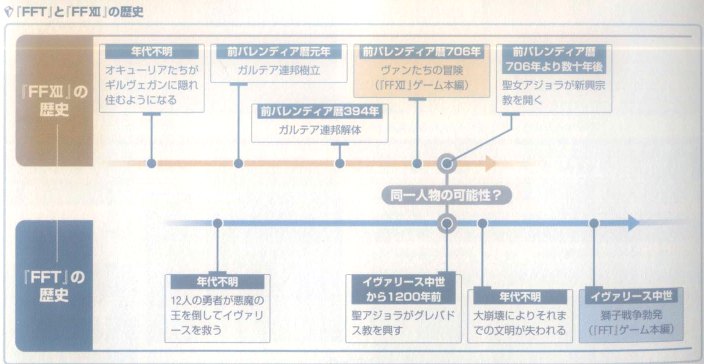
Note the orange-shaded box in the top row, representing FFXII’s events in the timeline, while the blue-shaded box in the bottom row represents Tactics’ spot.
For your added assurance, here is a translation of the text in those boxes, along with the Japanese text presented more clearly:
—
(Orange-shaded box)
“Before Year 706 of the Valendia Calendar
Vaan and co.’s adventure
(FFXII’s story)”(Blue-shaded box)
“Ivalice’s Middle Ages
War of the Lions breaks out
(FFT’s story)”
—Japanese text:
—
前バレンディア暦706年
ヴァンたちの冒険
(「FFXII」ゲーム本編)イヴァリース中世
獅子戦争勃発
(「FFT」ゲーム本編)
—
For the reader’s further edification, here is the complete official English translation of the Light of Kiltia entry from FFXII, as well as the complete entry in the original Japanese text:
—
Religion begun by the prophet Kiltia over two millennia ago. The religion of the Ordalian peoples is a dualistic system — a polytheistic pantheon with a God of Light, Faram the Father, at its head. After embarking on a pilgrimage to proselytize and deliver the word of the vision he had seen to the people, Kiltia came to Mt Bur-Omisace, and from there his teachings spread. The Light of Kiltia, as his teachings were called, continued even after his death, until they covered all of Ivalice. Though the followers and churches of Kiltia are spread far and wide, they do not interfere in affairs of state or governance. Though at one point the church held considerable influence, they willingly discarded that power, fearing oppression. Ever since, church officials with the rank of celebrant or higher have been forbidden from participating in statecraft. In addition, Mt Bur-Omisace maintains a mutual non-incursion policy with the surrounding territories. Several years after Kiltia’s founding, Saint Ajora began a new teaching, claiming that Faram alone was the one true god, the popularity of this new sect further lessening the power of the Light.
—Japanese text:
—
キルティア教
今から2000年ほど前に予言者キルティアによって始められた宗教。
オーダリア各地の民族宗教を二元論で体系化している。
光の神・善神ファーラムを主神とする多神教で多くの神が存在する。
開祖キルティアは布教の旅を続けた後にブルオミシェイスへ身をよせ、
教えを広めていく。
それはキルティアの死後も失われることなく、イヴァリース全土へ浸透する。
各方面に多大な影響力を持つキルティア教会だが、政治へ介入することはない。
一時は政治的権力を持ったキルティア教会だったが、弾圧を恐れてこれを放棄。
以後、司祭以上の役を持つ者の政治介入を禁じ、
また各地の為政者とは互いの領地への不可侵協定を結んで
ブルオミシェイスの独立を保っている。これより数十年後、聖女アジョラがファーラムを唯一神とする
新しい宗教を興し、勢力は衰退していく。
—
For another example of a mistranslation in official materials — one that hits even closer to home — consider this passage from the official English translation of Episode:Tifa, in which it is said that Cloud informed Elmyra of Aerith’s death:
—
As delicately as he could, Cloud broke the news to Elmyra about Aerith’s fate. They couldn’t be sure how she would take it, but the three of them apologized for not being able to save Aerith.
—
Attentive players will remember that Reeve had already informed her of this during the events of the original game, as revealed in the following optional dialogue from Cait Sith on the Highwind: “I went an’ told Aeris’ Mom about her death. Yes, an’ Miss Elmyra was cryin’ herself silly… So was little Marlene…”
While this, at first, seems a massive contradiction, upon inspection of the original Japanese text, a translation error quickly becomes apparent. Rather than the Japanese text saying that Cloud informed Elmyra of Aerith’s death, it says that he talked to her about what was done with Aerith’s body.
Japanese text:
—
クラウドはエルミナにエアリスの身に起こったことを話した。どのように受け取られるのか確信がなかったが、三人はエアリスを助けられなったことを謝罪した。
—
エアリスの身 (Aerith no mokuro) is “Aerith’s body.”
What’s more, while Elmyra may (or may not) have learned for the first time what became of Aerith’s body during this conversation, the passage as written merely says Cloud discussed the matter with her. The relevant verb here is 話した (hanashita), the past tense form of 話す (hanasu), meaning “to speak” or “to converse.”
Thus, the translation should be, “Cloud talked to Elmyra about Aerith’s fate. They couldn’t be sure how she would respond, but the three of them apologized for being unable to save Aerith.”
For the sake of being as informative as possible, it should be mentioned here that the revised edition of Episode:Tifa altered these two lines slightly, combining them into one, and only mentioning that Cloud apologized for being unable to save Aerith.
Japanese text:
—
クラウドはエルミナにエアリスの身に起こったことを話し、助けられなったことを謝罪した。
—
More recently, the official English translation for Final Fantasy XIII-2 had a significant translation error concerning the timing of Noel’s birth.
The official translation has Noel claim “I lived at the end of days. I was the very last child to be born” (screenshot). However, the following is what he said in Japanese (screenshot):
俺たちは 滅びの時代に生まれた
最後の子供だった
This translates to “We were born in a world of ruin. We were the last children.”
This distinction between “I was the very last child” and “We were the last children” is relevant, as Yeul was born after Noel. On pg. 191 of Fragments After (source scan courtesy of roxas9001), an official FFXIII-2 novel, Noel is said to be three years old at the time Yeul was born: “Though the man looked a lot like a monster to him, being only three years old, Noel was not afraid. He was desperate to protect the newborn Yeul, numbing his other emotions.”
Japanese text:
たった三歳のノエルにとって、男は魔物のように大きく見えたが、恐ろしくはなかった。生まれたばかりのユールを守らなければと必死で、それ以外の感情が麻痺してしまっていたのだ。
If, after reading all this, one still insists they must defer to the official
translation wherever it appears, they have the right to do so.
However, they are doing so while knowingly subscribing to an
unreliable standard.
Were it not already clear enough, with all this now addressed, these comments from Nomura and Nojima effectively resolve the matter of who Cloud is interested in pursuing a romance with.
The Love Triangle Debate is closed. Or so I wish.

